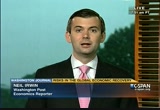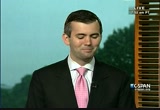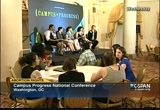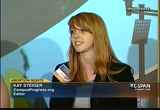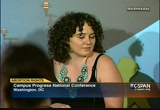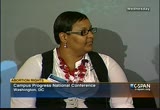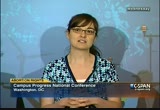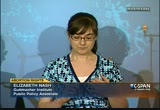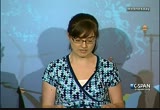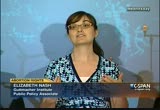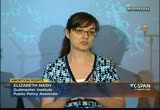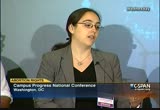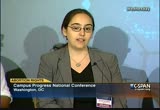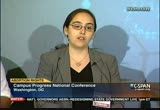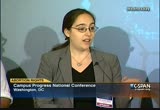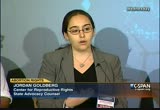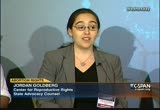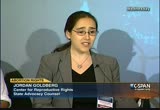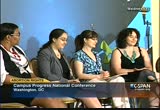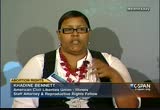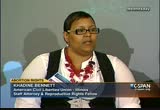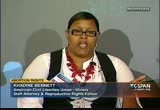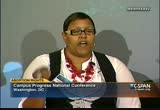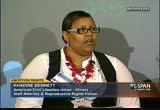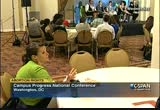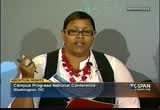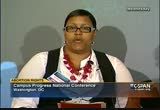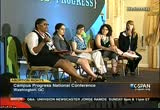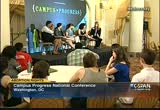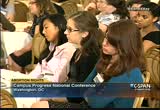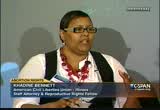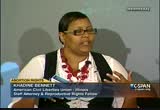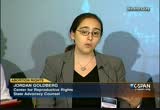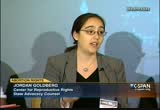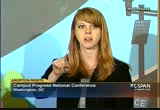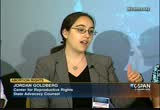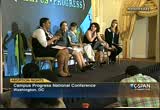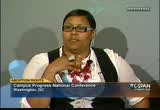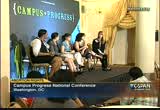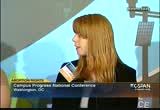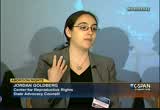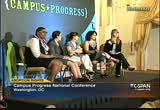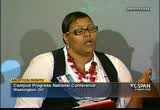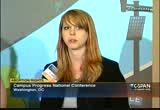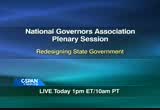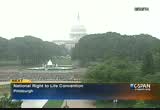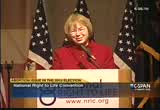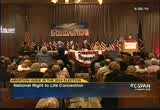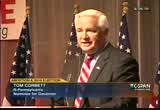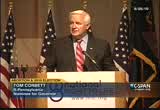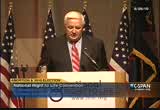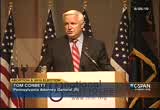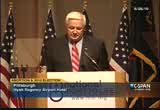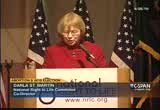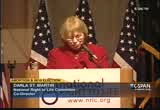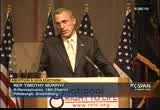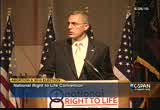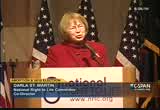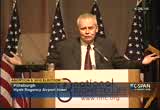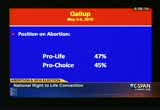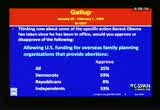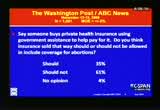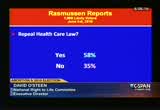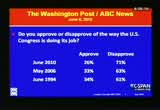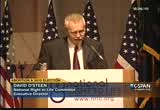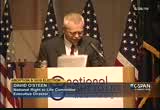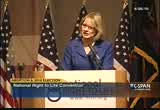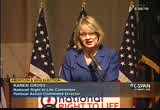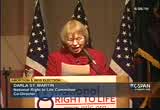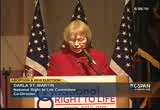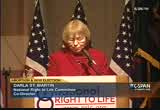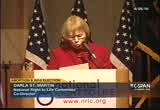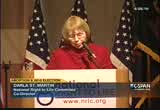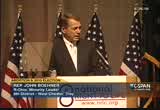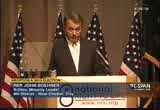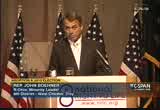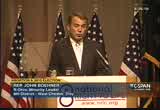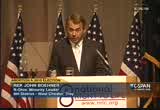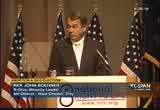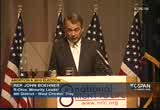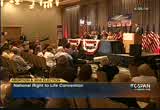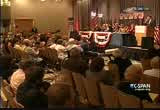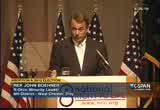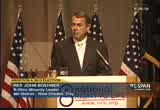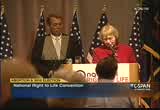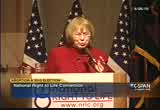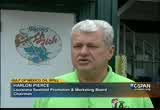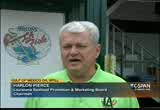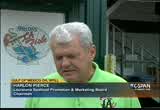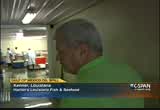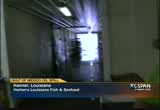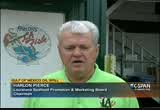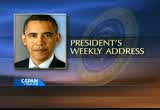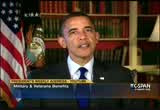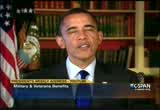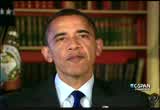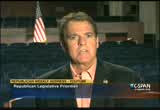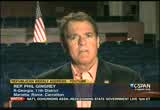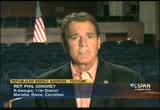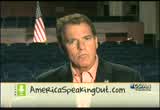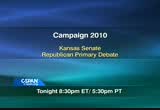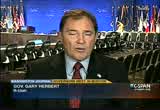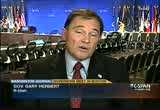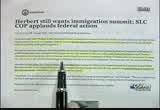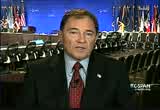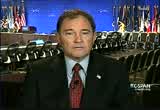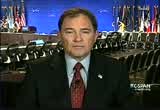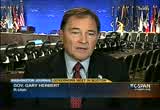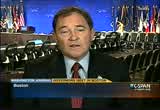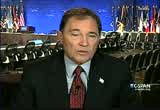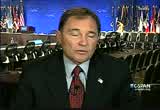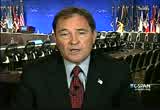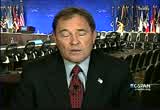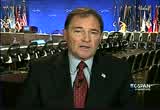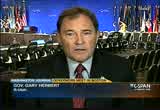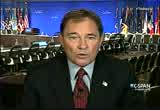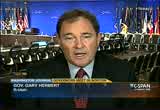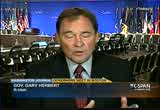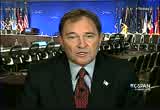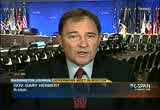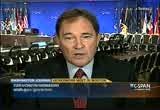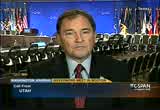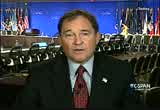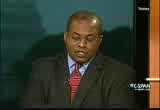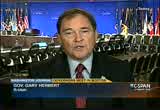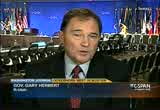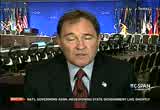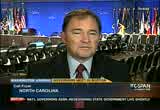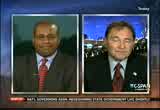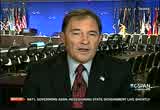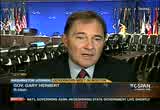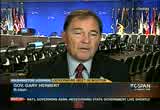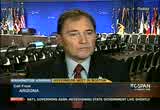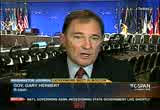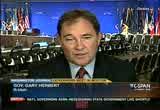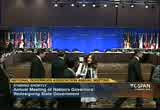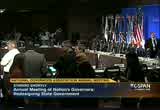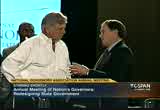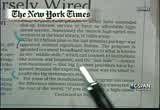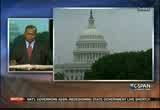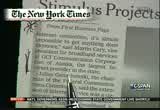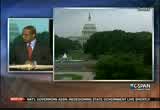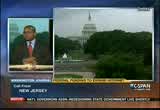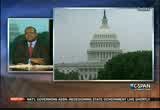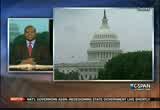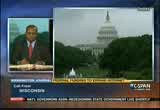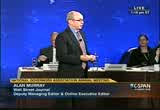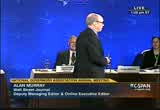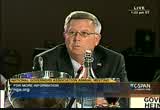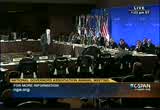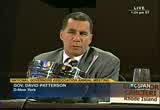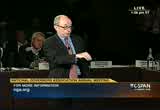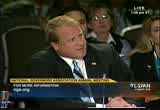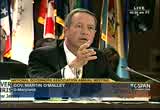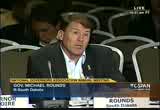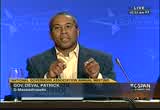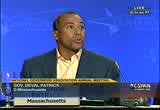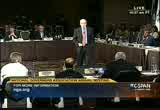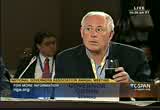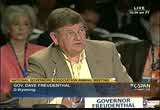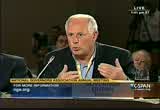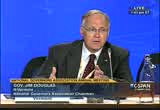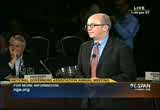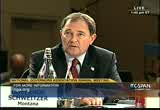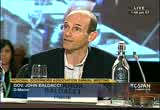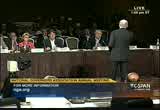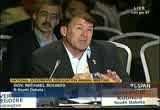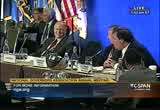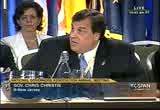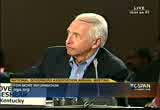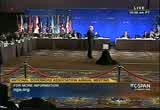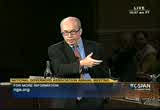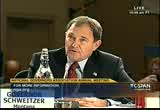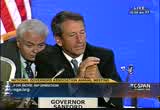tv C-SPAN Weekend CSPAN July 10, 2010 10:00am-2:00pm EDT
10:00 am
american dead. a few months ago, they refused to hold it. japan took a dislike. now channel -- now china on the $750 billion. the biggest mistake is moving from the dollar to the gold standard -- from the gold standard. in 1933-1934, that is one of the main reasons we went to war against iraq. petroleum is done through the dollar. they were going to change it to the euro. frankfurt, germany, holds the second load of gold. host: we will leave it there. guest: the u.s. is a reserve currency, is that as we took over from britain. this is a blessing and a curse. people use dollars when they want to exchange.
10:01 am
when things looked shaky, people pour money into dollars. that is what has happened. once a month in india by india -- buys oil from saudi arabia, the exchange in dollars and not in domestic currencies. the benefit of that is that we are able to borrow money cheaply. the government makes money on spending money. our borrowing rates are lit -- are lower. the downside is it pushes the value of the dollar up over what it would be otherwise which makes our exporters less competitive. us being the reserve come -- the reserve currency to to reach to these imbalances in important ways by making exporters more competitive. it seems over the last decade that the euro would arise as a competitor for the world reserve currency. that has shifted over the last year in the last few months. the future of the euro has been in doubt with greece and these
10:02 am
other southern european nations. the euro is looking shaky some people are pouring money back into the dollars. will that be the case in 50 years that everyone uses dollars as the world currency? i strongly doubt it. i think other currencies will rise, perhaps as a china less there's flow more, as the euro becomes more stable. that is an inevitable shift which has both good and bad benefits. host: neil irwin of "the washington post." thank you. i want to tell you about tomorrow's program. we will continue our coverage of the national governing proxy association. our guest is the governor of west virginia and the vice governor of the nga. the former iraqi minister of the finance and we will also have lesley sanchez from the resurgent republic. we want to thank you for tuning in to this edition of "washington journal."
10:03 am
10:04 am
10:05 am
great. we will go ahead and get started. reproductive justice, abortion in particular, one of the first orders signed by barack obama, the global gatt wg law. we thought that we saw abstinence only education to up funding -- education funding cut from the budget, only to reappear at the last moment. a lesser version of the amendment was attached to health care reform legislation. while much of the attention has been at the national level, they have been replacing legislation that limits or discourages women
10:06 am
from taking full of vantage of their reproductive rights. i have invited four amazing an expert panelists to discuss this today. let me go ahead by introducing our panelists. shelby knox, sitting to my right, maker of the documentary that documents gay-rights in a southern baptist community. she has discussed sex education on multiple television shows. [unintelligible] works for the organization to reproduce -- she coordinates the efforts of a state team that monitors and analyzes regulatory judicial actions and repressive health issues.
10:07 am
greenda goldburg, on her right, part of the protest legal advocacy group, wi legal analysis of legislative proposals affecting women's reproductive rights. development of promotion and active legislative policy strategies. kandeed bennet, staff attorney and legal fellow of the reproductive rights project at the aclu of illinois. involved in advocacy efforts, including federal and state court challenges and the campaign for reproductive health extras, an advocacy ever. -- effort. affording all the people in illinois for the full range of
10:08 am
birth control options and the right to choose an abortion. welcome to all of you. >> thank you. elisabeth -- >> elizabeth, you have been working on the states from a national perspective. can i get you to talk about the broader trends? >> absolutely. in 1973, roe came down from the supreme court and states immediately took up restrictions limiting the decision. we have been fighting this battle for a long time. at the same time we were always trying to promote new policies. i am going to focus my remarks a little bit about what has been going on over the past decade and what has happened over the last year. we have seen a shift between adopting restrictive policies on an even basis to a place where
10:09 am
we are now seeing only abortion restrictions. so far it has been a real shift over the past decade. we have had 27 abortion restrictions adopted at the state level. compare that only four pro- choice bills adopted. we are releasing a big shift. these restrictions are on a variety of topics. there are the responses that were adopted earlier this year. there has been an ongoing trend around ultrasound requirements. there is also an effort to grant personhood to embryos at the state level. the first issue has been in the news quite a bit. the federal health reform law
10:10 am
requires each state to set up a marketplace where people can compare plans. these exchanges must be in place by 2014. the federal government has mandated certain requirements for each plan in the exchange. there are also restrictions on abortion coverage and insurance. anti-choice legislators at the state level have seen this opportunity and are pushing to further ban or limit abortion coverage in insurance. so far this year we have had 15 states introduced legislation around abortion coverage to be a part of these exchanges. we have had it adopted in four states already. it was also vetoed in florida and oklahoma, however that veto did not amount to much since they already have laws limiting
10:11 am
abortion coverage in health plans. they're pretty typical of what we will see over the next couple of years. the arizona law will limit abortion coverage to situations when a woman's life is in danger or physical health is severely compromised. allowed only to except coverage when a woman's life is endangered or is a survivor of rape or incest. the two bills in tennessee have no exceptions whatsoever. the completely ban insurance coverage. four states of the five that banned abortion coverage, idaho, kentucky, missouri, north dakota, oklahoma, you are from some of these states. it might help to know that these things are happening in your own community.
10:12 am
we are expecting a lot more attention at the state level over the next few years. ultrasound has also got a lot of attention. there is a lot of variation in the issue. measures have been enacted in four. some of these laws deal with west virginia laws, offering the women the option to see the image. the oklahoma law is much more extreme. we're going to talk about the strategy and political nature around a lot.
10:13 am
it would be provided to every woman seeking an abortion. turning the monitor so that she can see the image. a very vocal description that includes limbs and internal organs. they're very disconcerting. allowed to look away, she still has to listen to the description. it is all pretty evridge this stuff. jordan's organization is doing a great job fighting it, but after seeing this issue pop-up, i would expect we would see it for many years to come. 17 states already have something on the books.
10:14 am
the final issue that i want to talk to you about, states have efforts to amend constitutions for personhood at conception. 13 states this year tried to get something on the ballot. if you are from colorado or mississippi, be aware that you could be asked to vote on an initiative that would grant personhood at conception. doing a lot of potential damage to abortion rights. those are pretty much the trends we are seeing this year. i am happy to take questions, but i hope that you all go home to get this -- take this issue has won the two would like to focus on. >> i would like to go ahead and
10:15 am
10:16 am
we have been involved in many ways, including the last one. unfortunately state legislators are much better at it and i am. working with people in the state to fight back about what happened at the state level. this panel, the new battleground for reproductive justice, has been the battleground for a long time. we have not necessarily recognized that as much as we should. there is a lot going on in the stage that can be seized much easier. many of the things that were enacted in federal law, on a
10:17 am
day-to-day basis when a woman tries to get an abortion in some states she is very impacted by the laws of that state more than anything else. i would like to add my voice, please get involved in your own states and see what is going on there. sari, had to give my shield first. what can we do in a walnut. -- oklahoma. they have made it their business to make it as difficult as possible to get abortion care in oklahoma. it was an omnibus bill that had six abortion restrictions in that. they immediately filed a lawsuit, claiming that the
10:18 am
oklahoma constitution said there could only be one in every law. it was struck down. in 2009 i did the same thing. of living have received the message separately. passing through, nationally and working with locals, which of these will have the biggest impact on women's lives? we tried to come up with a strategy for the oklahoma legislature and they might be
10:19 am
able to listen to reason. we worked very hard to encourage pro-choice legislators so that the press would cover the right positions. if they have to do this ultrasound process, with significant details given. covering 37 question questionnaires. there was a third bell that essentially allowed doctors to mislead about the health of
10:20 am
their pregnancy. it turns out that something was wrong in your doctor knew about it, you cannot sue him. i know i am taking a long time to tell a long story. unfortunately, the oklahoma legislature is very conservative. as elizabeth pointed out, this exchange bill that came on at the end of the session, this is the highlight of the story and something we can learn from.
10:21 am
10:22 am
talk about the ultrasound withholding information? it would have been so great if we could have gotten them earlier. religious leaders would have known that they were hearing from both sides. >> great, no pressure. [laughter] all those reasons are the reasons why in illinois we came up with a proactive legislation. we were tired of calling our representatives to tell them not to vote on this.
10:23 am
we wanted to promote affirmative legislation that had a minimum standard. we wanted to codify changes that, with provisions in their, they were part of a number of organizations. providing state protection for reproductive rights. our list was pretty long. which of those would have the broadest impact? that is how we came up with the
10:24 am
act, providing sexual education for young people in public schools. it is not about giving out condoms to kindergartners, it is about figuring out the information that they need. one person said they had sex more than they did their algebra homework. he did not know where to go to get condoms and it was not provided by the school. in illinois, even with all that money there is still pregnancy.
10:25 am
in a middle-class high school you are more likely to get sexual education than in a poor community. limited access based on where you live. if you are a woman in illinois, you are able to get funding for your pregnancy, pregnancy care. we wanted to address that disparity. it was also added on to our bill. balancing patient care with respect for religious beliefs, doctors and providers are able to refuse to give certain care.
10:26 am
while we believe in the ability to exercise certain religion, the bill would have created requirements that the provider would have had to put in writing the services that they do and do not provide. they would need to find someone to provide me with that service and do it in a comparative period of time with the doctor retaining the ability to not perform the service. we wanted decisions to be made by doctors and women that could accept a standard of medical care. we were giving a lot of overtime
10:27 am
bills and hoops that were based on politics. we wanted to say that if you are going to create a rule or regulation it should be based on medical practices this was great, exciting. people like having comprehensive, young people all the way into older folks. thinking about what the community needs. the other thing we experience that was not positive was a huge attack by the church. how many of you are from illinois? woo hoo. [laughter] as you may know, it is a pretty
10:28 am
catholic state. anyone from california? all son. catholic folks went hard-core crazy on us. every week they had visits with legislators. the archdiocese came down dressed in his robe, going the each of the legislators that were demonstrating support for the bill and told them not to support it. that they have to choose their faith and that their faith was unsupported. saying that the bill was bad and was against the church. we had scenarios where there was a lot of misinformation about
10:29 am
the bill. it meant that school nurses would be able to perform abortions in high school. [laughter] i read the bill a lot. that was a creative reading that they did to get to that point. even when things were not 100% accurate, they had visits from people that did not want this to go forth. we had multiple lobbying days, folks that were writing and calling. groups providing choices at the counter for the catholic community, saying it is one idea of what religious people think. that there were some that supported continuing care.
10:30 am
while the legislation is important, public education is equally important. we have had these community meetings. a lot of people do not know what the status is. just because the first person go walgreen's the thick of birth control, that does not mean that the next people can do it as well. it allows us to tell stories, stories of the people that are directly impacted. over the last few years -- this year we decided we would not introduce the bill, but that we
10:31 am
would do a lot of story collection and reintroduce that the year after. the -- the aclu is doing this reproductive road trip, looking for stories of how people's lives are impacted. available for community people to see, this idea of talking about this problem that does not exist. the other thing that has been important for us to realize, this is a multi-year process. people coming here thinking that everything is perfect in illinois. but we do not have a pro-choice assembly. pushing them to really realize that this is something that is
10:32 am
valid and needs to happen. we are countering years and years of anti-choice work. it is a proactive piece of legislation that works in our favor. it has a strong chance of passing. it will take a few years. >> something you find powerful in the hyper-local issues, can you talk about the work you have been doing around reproductive health? >> i will start off with my story, it is not as interesting to me anymore. at least not to me. how many are from texas? yay, we have one. sex is the most horrible, filthy
10:33 am
thing on earth, that is what they teach you. we had abstinence only until marriage in my school. we also have the highest rate of teen pregnancy in the country. great accomplishment. taught by local pastor, he had a wonderful toothbrush experiment where he would hold up a nasty, dirty toothbrush and ask if we would brush our teeth with this. he would -- we will also know. he told us that if we had sex before marriage, we were the dirty toothbrush. i started a campaign to a comprehensive sex education into the school.
10:34 am
the story was made into a film. it has been used across the country to talk about comprehensive sex education, convincing parents if they should as more questions. i do not work for any organizations, i just travelled across the country and work for young people and their reproductive rights. the thing that this is me off the most in the world is when people say that this is a post- war generation and we do not care. we are the generation that the government spent $1 billion lying to. we are the generation where pharmacists do not give birth control because they do not have to. if you have ever gone to a clinic and had protesters
10:35 am
screaming at you and you have been scared, i know that everyone in this room knows that. reproductive justice works better for us because of these things that are not specific abortion related. reproductive justice is mostly about bodily economy. do you want an abortion? or the rights for health care? do you want to have a family? do you want community support to take care of that family?
10:36 am
it is about health care in general. reproductive health care is health care. within the framework, the people of our generation are doing some very cool organizing the ground. we are the generation that has been the most impacted by abstinence only until marriage. highest rates of abortions and unintended pregnancies. we got screwed on that one. young people are finding that because they did not have sex education in high school, they need more resources from their college health centers. they need this sort of thing. lots of people are organizing on their campuses. crisis pregnancy center is a really cool one.
10:37 am
pregnant, scared, call this number. you go in and they tell a lot of lies about abortion -- for instance, that you abreast cancer from having an abortion. i often tell women she is too far along, by the time she figures out she is not is too late. they are sending people in to see exactly what the tactics are. exposing the power of story, referring to a crisis pregnancy centers. people are organizing campaigns to make sure that the center is now referring to a crisis pregnancy center.
10:38 am
i think that our generation is uniquely poised to take hold of. this is what we use it for. we use twitter, we feel like we're under a microscope. i went to this pharmacy and the pharmacist was horrible to me. one organization gathered 35 in one day. mostly through twitter and facebook. i will shut up and we can take some questions. >> what have you seen to be most effective? briefly, we only have five minutes.
10:39 am
but what kinds of things have been most effective in terms of fighting against this legislation or, in your case, working to be proactive? >> they were talking about the use of the word reproductive justice. we talked about the bill and it turned out that a lot of the folks that live in illinois, who are not part of organizing communities, a big chunk of southern illinois, the idea of reproductive justice does not appeal to them. the term that holds more resonance than justice. if you say justice i am ready to
10:40 am
get out of my chair. for folks not acclimated to that world, i cannot emphasize enough the stories. doing community forums with people from that community, listening to what they need and what they have to say, it becomes my job to make sure that what they need is reflected in the work that we are doing. >> when you are in that anti- choice legislation world, there are two important things to keep in mind. individuals have a lot more power than they think they have.
10:41 am
wherever you are, whoever you are, your congressperson represents 530,000 people, your state senator represents more. if you and your friends do your assemblyperson a call, it can make a big difference. make sure the people know what is going on in their state legislatures. make sure that they're paying attention. that the message is getting out. that this is what is happening. the important thing to keep in mind when you talk about reproductive rights, sexual
10:42 am
education as part of reproductive health care. it is important to talk about health, women having only a few children in their lifetime. something that people can do. having that perspective is really impacting individual lives. >> intergenerational organizing is really great. the most successful business that we had was parents going with their children. i know that many had to take off work to do that. sometimes legislators will tell you anything because you can vote.
10:43 am
it makes a difference with work like ours, and all and contraception and abortion. legislators say that they're doing it to protect their kids. i think it is more pro-choice. >> make sure that you have your fax straight. sometimes the legislator, if they know something about the issue, they might call you want it. >> make non-traditional partnerships with movements that might not be considered reproductive rights.
10:44 am
the key to all of this is that we are invested in different ways. making those partnerships can do a lot more hope. >> we care about those issues as well. >> time to move to audience q&a. if you could just line up at those microphones? >> what me trip as i get to the microphone. [laughter] you guys should definitely stop by our table. basically my question is the following. the subtitle of the panel is the battleground for reproductive justice and state legislators.
10:45 am
basically i know that before roe v. wade a bunch of state legislators the bloat -- legalized abortion. what are the lessons from the past that we can apply to the present? specially on the justice level. >> leflore get some of the history stuff. the first anti-choice law was adopted in 1850 in massachusetts. it was a movement that grew out of social justice starting in the 1950's. it was an entire movement.
10:46 am
talking to their legislators, working to expand access to abortion. that women should not be into -- in the back alleys. an upswing of interest in the people making sure that reproductive rates were real. there was an entire movement behind it. there was a very good book that just came out. if i could remember -- >> [unintelligible] >> yes, linda greenhouse. she just wrote this book.
10:47 am
she wrote it with an attorney. put it up. i just heard her seat -- speak about it. basically as telling us that the supreme court did not just make this decision. suddenly the state started adopting restrictions. we thought that the job was done. many of them have been struck down, but others come back. >> i wanted to add to that.
10:48 am
women have been figuring out how to plan their families since there have been women. there have always been that the of preventing and determining pregnancy early on. basically, after the supreme court said that women have a right to choose, and a law based on that will be looked at carefully. people that did not have anything to organize around. they have been relatively successful. it does win back the other way. the point that elizabeth made is absolutely right.
10:49 am
when we got roe v. wade people thought that we were done. clearly it was not the case. people will do something about it. >> making sure that organizing is still happening on the state level, either your board of education, many of the decisions in our lives are made at that level. concrete actions that we can explore.
10:50 am
>> one rollback is never one rollback. we can never accept these things as a being a small price to pay. the group that usually retains access, native women and military women, that is what happens. it energizes them every single time that they win. >> we have another question? >> can you hear me? my name is nicole, i am an intern with planned parenthood this summer. looking around the room we are here to talk about reproductive justice. when they did a poll, they said the big issue in the upcoming election is the economy and jobs.
10:51 am
the big debates appear to be about the economy and jobs, especially when they are key. >> still connected, part of the issue is people losing their jobs are being cut back in hours those -- hours. in a situation where people are losing their jobs, they're more likely to think about abortion as a potential option. some people are active in state medical assistance.
10:52 am
having to take care of the kids when going to work, it is a pretty broad area and it is our responsibility to learn about those connections. >> there was a recent study put out about the rise of four women have abortions. having access to reproductive health during these trying times. >> my name is laura. thank you for your remarks. in contrast to what you were saying, the poll seems to suggest that it is lower amongst our age group.
10:53 am
what might the reason for that be? >> it does depend on how u.s. the question. >> when you are considering going to the poll this fall, which three issues will you be considering most? >> talking about a gallup poll or something, shelby is exactly right. it depends on how u.s. the question. are you pro-choice or anti- joyce? are you pro-abortion? it depends on the words that you use. people do feel differently and respond differently. that could be a part of it.
10:54 am
i am in this in-between generation. between the feminists of the 1970's and third generation of feminists. it seems that there are many active -- many different ways to become active in these different environments and we need to raise the profile of reproductive rights. >> i also wanted to say that i think with reproductive rights and reproductive justice, was someone says to a gallup pollster who asks them a strangely worded question on the phone and what they say in a
10:55 am
conversation is very different. there has never been an enormous debt, as people have claimed that their position has changed. this is a reproductive health needs of women have and you have. summing it we need to think about and talk about more. with that said, i think my favorite new poll is for our generation. when young women are asked if they support the issues and goals of the women's liberation movement, 90% say that they do. only 74% say that they do. >> interesting. >> i think we have time for one
10:56 am
more question. >> my name is stephanie. how important is the upcoming midterm election? >> well? >> you go. >> i think it'd is incredibly important for us as progressives. there are things that we have to know. this idea that we would rather win seats -- especially in the house -- we would rather have strong pro-choice, pro-women candidates. this was a big problem when we had our own members that we thought we could count on, they went over and said that they were anti-choice. i am fine with getting rid of those people.
10:57 am
i would rather have fewer seats and know who my enemies are then be wondering what will be sold out by in the end. >> coming from the state world, i would say that all but five states have elections this fall. go, please. find out where you are voting in who you are voting for. find out what their positions are. anyone from alaska? no one. but they are voting in august on abortion. find out what is going on in your world. hold those feet to the fire. >> i think that congressional midterms are important. >> on a day-to-day basis, a
10:58 am
woman's access is based on data the legislature. holding congressional people accountable, people should be looking at the positions of the state legislators that -- elect them. >> can we answer any more questions very quickly? >> we do have to break up and the facilitator groups soon. >> i really appreciate it. my name is julia. shelly said something that really resonated with me. it is important to recognize how these movements are interconnected. i was recently at baltimore pride and was disheartened to see a group of gay, lesbian, transsexual, bi-gender people
10:59 am
who were anti-choice. were you able to ever partner with a group and message is issued to other groups? successfully? >> that is sad. the coalition that we are a part of, we do have a i think the most progressive view in the entire world. we got to talk to a group of nuns from across the country at a retreat about the bill. if you are not a huge fan of abortion, why this is needed and facilitated. it is about one-on-one communication with those folks. talking to them, saying that this is the work we're doing here is how we can partner. if you start those relationships
11:00 am
soon, the sooner the better. three months from now when you need a presence, that is what it pays off. making sure that it is continual. >> great, thank you so much to our panelists. [applause] thank you all. we are going to break up into groups now. facilitators, if you could just find a table and take the questions. or come up with your own. [captioning performed by national captioning institute] [captions copyright national cable satellite corp. 2010] .
11:01 am
gov. james douglas of of vermont, the governor of west virginia. that is live at 1:00 p.m. eastern here on c-span. tonight, a kansas senate republican primary debate. some of the topics include tax policy, the arizona immigration law, and prosecuting suspected terrorists. that is a 30 p.m. here on c- span. -- that is at 8:30 p.m. here on c-span. also tonight, barack obama speaks.
11:02 am
republican candidate for congress talks in missouri about the economy and jobs. that is at 9:30 p.m. eastern here on c-span. >> sees them is not available in over 100 million homes bringing you a direct link to public affairs, politics, history, and a nonfiction books. >> next, house minority leader talks about abortion rights at a national right to life convention. also, remarks from the republican nominee for pennsylvania gov. and pennsylvania representative tim murphy. from pittsburgh, this is about one hour ago -- one hour. >> welcome to this session of the annual national right to life convention. this year, we are faced with
11:03 am
great challenges but we also have greater opportunity. the threats to unborn children's lives have never been greater and yet there is an awakening across this country about the humanity of unborn children. they see the ultrasound and they know what abortion does to an unborn child. this session is about what people are doing to protect unborn children and to make their government more responsive to protecting the unborn children. i would first want to introduce to you the head table.
11:04 am
i am the co-director of national right to life. to my immediate right, legislative and political director for the pennsylvania pro-life federation. attorney general tom corbett of pennsylvania. [applause] you seem to be pretty popular here in pennsylvania. wait a minute. congressman tim murphy. [applause] also very popular. he represents this district.
11:05 am
11:06 am
charlene will now introduce the attorney general, tom corbett. [applause] >> thank you, darling. two years ago, as you recall, we had the privilege of hearing from the then attorney general and now gov. bob macdonald. we in pennsylvania are very proud of our attorney general. in fact, tom corbett's decisive victory in november 2008 for reelection was probably one bright spot in a day we would otherwise like to forget. as attorney general, he is known for his column and forthright demeanor, his fair but on waiver of prosecution of public officials who betrayed public trust. [applause] anbar making pennsylvania a
11:07 am
better and safer place for all of our families including our unit test and the most vulnerable family members. please welcome attorney general tom corbett. [applause] >> thank you, charlene. i appreciate the invitation to attend today. on behalf of the commonwealth of pennsylvania, let me welcome you to pennsylvania, my home town. i know tim will say the same thing. for those of you, how many of you are from out of state? can i see a show of hands? wow. come here and spend a lot of money, please. [laughter] we need the help with our budget and we could use our -- use your help. i hope you have had the opportunity to see southwestern pennsylvania particularly pittsburgh. we really enjoy the beauty we have here.
11:08 am
i get to travel much of the country, but i always come home to pennsylvania. it is a beautiful and vibrant city. i encourage you if you have not experienced expert to go and see some of our great museums. we have a world-class museums of natural history and art. take a look at the city of fitchburg and see where the two rivers come together. it forms the allegheny and the ohio. it is so important -- so important. send those calls itself to the gateway city, but we called ourselves the gateway city long before that. we were the gateway to the midwest and to the west. it is a tree to go up mount washington. too bad we did not have our traditional weekend of a fireworks. we have firework's about every
11:09 am
other weekend. it is a great place to be the fireworks. and i know you are here for a greater purpose is to celebrate a very important movement, the pro-life movement. i want to congratulate you for having your 40th annual convention. it does not seem like 40 years in some respects. it probably seems like more than that in other respects. it takes a tremendous dedication to accomplish all that you have done as an organization to run the years ago -- throughout the years. each of us has a significant role to fulfil in restoring respect for the most defenseless months thus, the unborn. the theme of the conference, "we are making a difference," is appropriate. we across the country and in pennsylvania are making a difference. look at pennsylvania. because of a bipartisan, and that is an important word, bipartisan support of pro-life
11:10 am
leaders in 1989, more than 20 years ago, we saw the passage of the pennsylvania abortion control act which has saved numerous lives. [applause] it has been my honor shortly after taking office in to thousand five that i'd joined with 17 of my colleagues in support of new hampshire's abortion control statute which was challenged by planned parenthood. the case was the first to challenge an abortion control log in the supreme court that they had -- an abortion control a lot that the supreme court had accepted. the world that the first circuit court of appeals overstepped their bounds when they blocked new hampshire's parental notification law. i think we are making progress.
11:11 am
on the national front, we are fortunate to have, and you rightly gave him a standing ovation, house republican leader john baer -- john baynor and his leadership in congress. [applause] congressman, i want to thank you for standing up for your convictions and for your example in washington. we must remain hopeful. we must remain committed. this is how i believe as a society we will be judged. i encourage you to get to a new for providing your community about the undeniable humanity of the unborn. working together we will continue to make a difference by j.d. and saving lives in this way. may god bless you.
11:12 am
may god bless the commonwealth of pennsylvania. may god bless the united states of america. thank you all very much. welcome to pittsburgh. [applause] >> thank you very much. now, another leader for life, congressman tim murphy, is also here to speak with us. three of his career as a child psychologist, state senator, and u.s. representative, tim murphy has championed the sanctity of human life. in his four terms as representative of pennsylvania's 18th congressional district, congressman murphy has a perfect voting record on pro-life issues. [applause]
11:13 am
he has voted to ban partial birth abortion, to prevent alternatives to abortion. tim has supported legislation that prohibits transporting minors across state lines to receive abortions in order to circumvent. ladies and gentlemen, it is my great pleasure to introduce to you congressman tim murphy. [applause] >> thank you. thank you very much and welcome to all of you and welcome to my republican leader, john boehner. did you have you here. although we are happy and smiling and pleased to be here for our cause, we recognize the gravity of what is behind this and what is before us.
11:14 am
some years ago when i worked in a newborn intensive care unit, i remember -- this one was born addicted to crack cocaine. it was not much bigger than my hand and shaking and triggering -- tremoring. i said to the nurse i could not take it anymore. i needed to take care of these problems before they get to this level. once again, i feared it was another baby whose mother was addicted to drugs and would travel in life and the baby would end up somewhere in the foster care system or who knows. where some see the answer to that is to say let's aboard these babies so that child does not face the future. -- lets the boards these babies.
11:15 am
i say let the children live so they have a chance for a better future. [applause] as i have gone through the years, i remember when i was first elected to the state senate there was a baby for the first election. someone in the audience asked what we propose to do for the children growing up in poverty. how can we force these children to do that? my answer was the children deserve a chance to have a choice in life. these children deserve to grow up, go to school, and believe in great things and not be told all their lives they are a victim of poverty. these children deserve a chance to have a choice to be doctors, lawyers, teachers, carpenters, or whenever that is. as i have gone through the years, i always meet parents,
11:16 am
and perhaps sometimes the kids that. some years ago, and it makes me feel like i am really young. sometimes i have an opportunity to meet their own children who in many circumstances they are younger than the age limit we set for par from -- for a partial birth abortion. they had the chance to have a choice to be something in life and that is what they did. that is the task before us. i am so glad that all of you are there and the thousands of people you represent and the millions of people they represent. americans who feel that abortion is not something we should fund with tax dollars. nor should we allow our tax dollars to go overseas to fund abortions there either. [applause] life has its struggles, but life
11:17 am
has also had its infinite joy is an incredible opportunities. i am so very, very thankful that all of you, whoever you are, wherever you from coming in every spectrum of our society represent that you also believe that every kid deserves a chance to have a choice of life. every child deserves to have a choice at life. every baby this -- deserves to have a choice that life. every parent should be supported. thank you so much for all you do. [applause] >> and now, i would like to introduce our very own executive director.
11:18 am
he will talk to you about numbers. this is very appropriate. his ph.d. is in mathematics. he is like so many of us who work in the pro-life movement had another career but gave up a career in order to dedicate our lives to unborn children. it is a tremendous advantage for all of us because he understands numbers, he understands public opinion numbers, and now he will share some of these numbers with you. [applause] >> thank you. darla mentioned i will be sharing some numbers.
11:19 am
at the national right to life we analyze polls, numbers, and try to gauge public opinion. i want to see if this actually works. i have noticed in washington from time to time, i have noticed one of the great gauges of public opinion are the t- shirt stores. people come from all over the country and they buy t-shirts. the shops want to sell t-shirts than they think people want to buy. sadly, i remember fall to thousand eight hours picking up my brother and this one a t- shirt shop right there, everything seemed to say obama or change. i was there last week picking up another brother coming in and the same shop had t-shirts. they said nobama and change it
11:20 am
back. [applause] the first bit of data i want to share with you. gallup just released polling and said today, the normal is to be pro-life. more people id themselves as pro-life and pro-choice. [applause] you have to remember that while we are proud to say we are pro- life we are against abortion, against rationing health care, against euthanasia. the other side, their leadership does not want to say we are pro- abortion, but that is what it is. they hide behind the moniker "pro-choice."
11:21 am
they oppose using tax dollars to pay for abortion and actually when they have a choice between a candid it devotes a pro-life and a candidate who favors using abortion as a method of birth control and using tax dollars to pay for it, they vote pro-life. our strength is stronger than that. an overwhelming majority oppose using tax dollars to pay for abortions. when the current democratic administration came into office, they were facing a recession in january 2008. he was facing a recession, unemployment, which continues to hover around 10%. what did he do? he repealed the mexico city policy and began sending
11:22 am
millions and millions of our tax dollars overseas to organizations that perform in promote abortions. what do americans think of that? 35% of americans approve of one of his first actions in office, funding organizations overseas that performer and promote abortions. only 33% of independence approve of that. i think that is significant. following the line that most americans do not want their funds used to support abortion, a poll in 2009 asked the question, "if government funds are used to help pay for health insurance, do you think it should cover abortion"? 61% of the population said now. but what did the democratic administration and the
11:23 am
democratic congress do? they passed a health care plan passed by 219 democrats in the house and 56 democrats in the senate without a single republican vote. they passed a health care plan that will not only used government funds to perform abortion on demand but will also rationed or health care. it is no wonder that today 50% of americans believe the plan should be repealed. [applause] it is also no wonder that this june 8 polls shows that 69% of americans are dissatisfied or angry about the way the federal government is working. [applause]
11:24 am
what do they think of the job that congress is doing under its current one party leadership? 71% of americans disapprove of the job congress is doing. in june 199471% disapproved -- 61% disapproved. in each of those years, congress changed party in the following election. gallup found this june that on what is called the generic congressional ballot 49% of americans say they want to vote republican for congress opposed to 43% for democrats.
11:25 am
why do i put this up? the national right to life is a nonpartisan organization. there are some republicans that are pro-abortion and there are some democrats that are pro- life. looking at the races right now today, in every closely contested congressional or senate race where there is a pro-life candidate and a pro- abortion candidate, as of today in every race the pro-life candidate is a republican and the pro-abortion candid it is a democrat. looking at this congressional ballot, rasmussen reports that 44% once to vote for a republican and 35% for a democrat. on january 18, 2009, two days
11:26 am
before the inauguration, that number was flipped. 42% would have voted democrat and 35% for republican. what kind of job is obama and the administration doing? the have increased the republican ballot by nine points and a decrease the democrats vow by seven. . some would say they are doing a good job. i would just conclude by telling you -- to answer a question from 2008. yes, we have hope. we will remember in november. [applause] >> and now we would also like to have a few words from our political action committee director, karen cross.
11:27 am
[applause] >> hello. for four decades the national right to life has worked to meet the challenge and returning a culture of life in america. through education, legislation, and political action we have touched hearts, changed minds, and save the lives. we are making a difference. [applause] our educational efforts have made a tremendous impact. the survivors of roe vs. wade are not just embracing the pro- life position, they are acting on their convictions to say their generation. lifesaving and life affirming legislation is being passed in
11:28 am
states nationwide into ultrasound legislation -- states nationwide. thanks to alter some legislation, some mothers change their mind. in south carolina, there are more than 95,000 children alive today because of a various pro- life laws enacted. those 95,000 families are blessed with a child instead of cursed with despair and regret. in order to pass those life- saving laws we are involved in political action. polling continues to show that the public is increasingly dissatisfied with the policies of this pro-abortion administration. i suspect some of you may be in this very room. this has been a very competitive primary election cycle with an unusually high
11:29 am
number of candidates running for congress. top political analysts are moving these into the gossip category each week. the last 18 months have been extremely challenging in the pro-life movement and often downright discouraging. we have seen the passage of health-care legislation more than 2000 pages that will provide government funding for health plans that pay for abortion on demand and promote the rationing of life-saving medical treatment. after the 2008 election we were told it was over. your presence here today is evidence that we did not pack our bags and go home. [applause] we have persevered as a movement because of you. we are truly amazing.
11:30 am
you have a passion for the most vulnerable in our society, for those who cannot help themselves. you have compassion for mothers and you open your hearts to those of us who have tragically ended the lives of our own children. while this year has been filled with challenges, it is also presenting many opportunities. you will rise to the challenge and take advantage of every opportunity because you know that too many lives are at stake. the national right to life is prepared to once again meet these challenges but we cannot do it without you. you are the national right to life and you are making a difference. [applause] with your help, your energy, your passion, your enthusiasm,
11:31 am
and your determination we can make of this year a pivotal turning point for our country and our culture. thank you. [applause] lula -- >> now have the privilege of introducing our guest of honor, house speaker -- i am getting ahead of myself here. [laughter] republican house leader john boehner. i am dreaming. [applause]
11:32 am
i think you all like to my mistake there. that is what we want to happen in the future. throughout our 20 years -- throughout his 20 years in congress, but as rep from the eighth congressional district and as a leader of house republicans in all the old port leadership's he has held co -- he has held, he has been a faithful the founder of unborn children. seniors whose right to life might be jeopardized, he has consistently voted to advance pro legislation and block anti- life legislation around his two decades in the house. mr. bowhner has been an active
11:33 am
supporter of a number of successful efforts over the years including his co-sponsor ship of the assisted suicide finding prevention act enacted in 1997, the partial birth abortion ban enacted in 2003, and the unborn victims of abortion enacted in 2003, and the unborn victims of violence act enacted in 2004. in january 2006, he asked his fellow house republicans to elect him to the office of majority leader which is the second-highest office in the u.s. house of representatives. they did. on that occasion, mr. boehner
11:34 am
circulated a letter. one thing that has touched me during the process is the commitment many of our members have to protecting the lives and insuring our nation's laws reflect a belief in the sanctity of life. i write to you today simply for the purpose of reaffirming probably in that i share this commitment completely, totally, and without equivocation. it is a commitment i have felt deeply the run my life and it is a commitment i will uphold unapologetically if and when i am chosen to be your next majority leader. i have always voted to protect the rights of unborn children and as long as i am an elected
11:35 am
official i will continue to do so. as you know, in january 2007 the majority control of the house shifted to the democrats and his republican colleagues elected him their leader as the minority leader. he has been a major impediment to the enhancement to the pro- abortion agenda. [applause] as soon as obama took office in january 2009, mr bohner and mr. cantor coordinated a letter
11:36 am
signed by house republicans urging the new president to withdraw his pre-election pledge to sign the freedom of choice act. during a long battle over president obama's healthcare restructuring legislation, mr. boehner relentlessly used his power on the attempt to smuggle into law undraping as we've been pro-abortion and a pro-ration in provisions. mr. boehner applied the procedural tools at his command to make things difficult for the pro-abortion opposition. some of the offensive parts of the health-care bill were jettisoned a due to his effort. he stood for the strong principles. abortion is not health care. i am sure none of us will ever
11:37 am
forget the sheer force of his speech as he boldly confronted nancy pelosi and the other pro- abortion democrats as they rammed their deadly bill for the house. it is a testament to his skill as a leader that on the final votes, not a single one of the 178 house republicans voted for the deadly, pro-abortion obama- care bill. [applause] on behalf of every pro-life person here and across america, we think you, john boehner. [applause]
11:38 am
>> thank you all very much. thank you. i am deeply honored to be here today with all of the. and in the program says i am here to except an award, but really it is not my work we should be celebrating today. it is your work we should be celebrating today. it is the collective energy to the national right to life committee. it has made the real difference in our country. i nt to thank each and every one of you in this room for the leadership you have demonstrated in your communities. to those of you who have devoted their lives to defending lives
11:39 am
is honor to me. i am humbled and inspired by confidence in me. it just came naturally. it is what my parents instilled in me as i grew up in america. i grew up in a small house in cincinnati with a big family. i have 11 brothers and sisters. [applause] it was not easy for my mother to have all swell of all of us, but i am glad she did. -- all 12 of us. she said all 12 of us to catholic schools and it was not easy for them to do that either. [applause] they could have used that money for a lot of other things, but it was important that we get a good education.
11:40 am
a good education to them men more than just the -- meant more to them than abc's and being able to count 123. it was important to them that we learn values and respect for life was at the top of the list. as i went through that process, i realized a few things about who i am and who we are as a people. americans love life and freedom. america is a nation built on freedom. without respect for life, freedom is in jeopardy. when this takes a back seat to other priorities, personal comforts, economics, freedom is diminished. by contrast when we affirm the dignity of life, we affirm our commitment to freedom.
11:41 am
these are fundamentals in the american experience. they have real implications for government and those who are accustomed with power. for like the leaders, it means we should always err on the side of life. we should always respect the dignity of life at all stages from conception, birth, to the very end of life and everything in between. it means you have a moral obligation to defend the defenseless. there is nothing more defenseless, more innocent than an unborn baby. [applause] the defense of life and the defense of freedom are necessarily linked. we know this to be true. if we accept it, then we cannot
11:42 am
accept the current political agenda in washington because it is a threat to freedom. gov. bob macdonald, the new governor of virginia, said in his response to president obama's state of the union address, "america must always been a land where liberty and property are valued and respected and innocent human life is protected." [applause] i never sought to be recognized as a leader of the movement. i never wore my pro-life credentials on my sleeve. i just voted for what i thought was right and stood up for what i thought was right like all of you do every day. over the past few years, i have been compelled to raise my voice and to speak out in little more loudly. we look at the agenda being puued in washington, if you believe in the right to life,
11:43 am
being quiet is not good enough. [applause] we do not have the luxury of being quiet. if you looked at what is going on, but there is a constant tearing down of walls that have stood as the last line of defense in the decades since roe v wade was enacted. these warning signs were there all along. before being elected as our 44th president, senator barack obama spoke at a national planned parenthood prevention, the nation bloc's largest provider of abortion. he embraced the freedom of choice act. he promises to make the enactment a priority if he were elected president. during the president's first week in office on the 36th anniversary of roe vs. wade,
11:44 am
when her 14 of my colleagues and i sent him a letter urging to withdraw his pledge to sign the freedom of choice act into law. our town was respectful. our message was one of hope. the letter said, "americans from all walks of life have been touched by your pledge to govern from the center. you've got it to the president for all americans. you expressed a desire to be president for all americans and to use your presidency to promote initiatives every american's together, not drive them apart. we asked him respectfully to withdraw his pledge to sign the freedom of choice act. we never got a response to that letter, not in writing or in any of our way. in the 18 months, we have got our answer. tragically, it has come to the administration's on actions.
11:45 am
the agenda is being implemented incrementally step by tragic step. in the first few months of his presidency, obama took at least three separate actions we getting american rules that were meant to say -- safeguard the sanctity of human life. even repeal the mexico city law that provides abortions overseas. he took it upon himself to create better incentives to destroy human embryos taking this action anytime when assigns was demonstrating that the true potential of stem cell research lies in the type of stem cell research that does not require the destruction of living human embryos. [applause] in weaken the protections for those doctors and nurses that
11:46 am
decline to provide abortions. most of these were renounce the late on friday afternoon. now, in washington a friday afternoon announcement is code you are trying to hide something. this is a pattern we have seen repeated throughout the administration. the latest instance, the obama administration is moving to allow abortions on military bases. it is fairly ironic and profoundly disturbing that our government would endorse the destruction of american lives on the same soil are men and women walk each and every day in the defense of freedom and liberty. [applause] it undermines everything the men and women of our military are fighting for. there is the president talks a massive overhaul of our health- care system, obama-care.
11:47 am
the overwhelming opposition, the taxpayer funding of abortion almost kept it from becoming law. the bipartisan majority supported the amendment which it would have provided taxpayer funding of abortion through the health-care bill. the health-care overhaul was not being driven by the will of the people. it was being driven by the will of special interest groups, radical special interest groups who believe the destruction of unborn human life is health care. ultimately, it became apparent to the white house and democratic leaders that they could not find the votes to kill the pro-life stupack amendment. instead of heeding to the will of the people, they crafted a disingenuous last-minute
11:48 am
executive order that they claimed eliminated the need for pro-life protections in the bill. the president issued the order and the white house aides indicated that its enforcement would be a priority. that, sadly, was good enough for a handful of legislators including rep stupak who of to the point had mounted a courageous fight. they doubted the administration's sincerity with good reason. three months into the implementation of this new health care law, and as far as anyone can tell they have not lifted a finger to enforce the executive order on funding abortions. secretary civilians -- secretary civilians made no mention of the executive order on abortions. i questioned her about it and she said the administration is
11:49 am
"working on it." several weeks went by without any apparent action. two weeks ago, at the white house, i ask president obama about it personally. everyone in the room heard me ask the question and we are still waiting for an answer. i say all of this with great sadness, a sadness for the unborn absolutely. also this is sadness for our nation. these policies do not unite america. they divide america. in the coming months, america has to decide whether we are going to continue to allow this continue. we recently launched an initiative called america speaking out. it is involved in engaging the american people directly in the process of crafting a new governing agenda for congress.
11:50 am
one of the tools is a website, americaspeakingout.com. they can vote on ideas. go to the website, tell your neighbors about it. use it to get engaged in the government. one of my all-time heroes was congressman henry hyde. [applause] part of his legacy is the hyde amendment which prohibits congress for a probe braiding taxpayer funding for abortion. one of the many ideas being discussed right now on america speaking out is the idea of codifying the hyde amendment so it applies to all federal funding whether they are a probated by congress or
11:51 am
authorized. i believe this must be the next objective for pro-life america. it is clear from the health-care debate that the american people do not want their tax dollars used to pay for abortion. a bipartisan majority in the house agrees. it is the will of the people and it ought to be the will of our land. it ought to happen right now. [applause] i am pleased to announce today that congressman smith of new jersey will introduce legislation to accomplish that goal. i intend to be an original cosponsor of the bill. [applause] once it is introduced, i will call on speaker pelosi and hoyer
11:52 am
to bring it into an immediate vote. it is time for washington to stop defying the will of the people. i also believe we need to repeal the health-care bill and start over. [applause] thank you. thank you. [applause] you know, we can start over with common sense reforms that will lower the cost of health care in america and protect the sanctity of human life. our nation was built on ideas that came directly from the people, people that took an active interest in their government. americans need to be engaged today because the people running our government have not been
11:53 am
listening. it is the failure -- if the failure continues, the results could be catastrophic. the and parenthood and other radical groups will determine the direction of our government while the voices of the pro-life americans are shut out. it will mean two years of supreme court appointments for activist judges who do not think that roe vs. wade was radical enough. it could set back the cause of life for decades. as with the head, we need to know who the defenders of life really are. -- as we move ahead, we need to know. no one gets a pass. the stupak amendment was a moment. while anyone can say they are pro-life, actions speak louder than words. [applause]
11:54 am
thank you. the lesson is to get involved, speak out, find out where your legislators and would be legislators stand. is your member of congress to mid -- committed to the defense of life or is a negotiable? is your member of congress truly dedicated to protecting the unborn or can he or she be swayed by a pork barrel project or a new government program or maybe some plum committee assignments? this is the time to know the answers to those questions. this is when it matters. you invited me here to give me an award and i gratefully accepted. let's be clear. the true leaders of this moment -- of this movement are sitting in the audience this morning. what i do matters in whole lot less than what you do. i mentioned henry hyde and i want to close by mentioning him again for a few reasons. first, he was my friend and
11:55 am
probably the cali i have admired most. -- probably the colleague i admired most. second, the and -- the examples he said in the way he conducted himself and defended life are examples i think all of us must follow. henry was at peace in the presence of others, even those who disagreed with him profoundly, but he was comfortable with them because of his unshakable faith in the sanctity of every human life. when henry died a few years ago, i had the chance and the honor to being asked to speak at his memorial service. i recall some of my words then. treating everyone with dignity and respect came naturally to henry, not just because he was kind and flow of decency, but because he truly believe that all human life is precious. henry was right.
11:56 am
there is no cause more noble than the defense of human life. there is no mission more critical, no debate more urgent. you know this in your hearts or you would not be here today. from the bottom of my heart, i want to say thank you for this honor. thank you to all of you and for all that you do to defend freedom and defend life. thank you very much. [applause]
11:57 am
11:58 am
roots people working around the country in solidarity with our leader. >> thank you. thank you. [applause] thank you. thank you. [applause] >> please, you may speak to him after the program. may we finish our program? john boehner, we are all thrilled to have you here. mr. boehner, we know our opposition is rather be him and
11:59 am
occasionally. -- rather vehement occasionally. we're thrilled to have you here with us to receive the 2010 legislative leadership award and we need more great leaders like congressman boehner all across america. thank you and goodbye. [applause] >> today, the national governing proxy association annual summer meeting focuses on redesigning state government. he will hear from "the wall street journal"and the governors of vermont and west virginia. that is live at 1:00 p.m. eastern here on c-span.
12:00 pm
>> the senate judiciary committee returns next week to vote on the nomination of elena kagan as the newest supreme court justice. watch coverage on the c-span networks and learn more about the nation's highest court in this keyspan's latest book, "the supreme court -- candid conversation with all of the justices current and retired." it is available in hardcover and as an e-book. .
12:01 pm
>> the third, we need to have more vessel of opportunity going back to fishing. >> how many fishermen are in the water right now? >> in may of 2009, which had 4500. in 2010, we had 2800. that is just about the difference in the vessel of opportunity program, a program waiting to go to work for bp. 2800 vessels are signed up. there are 650 workers.
12:02 pm
our goal is to get those fishermen back to work. >> what is the incentive for a fisherman? >> i am try to get bp or ken feinberg, whom we had a good conversation with, to give the fishermen a bonus based time last year pulled the average price. if they went to the dock, they went to the docks, they would get a 30% kick that would give them an incentive to go back to work. if a guy is not efficient, that is 100% damages. if he is fishing and getting 30%, bp will save 70%. the consumer needs to understand that the restaurants they have the connect our -- that they had
12:03 pm
eaten at are the same restaurants. they make sure they do their job correctly. our industry is self-policing. if you did not sell a good product, you do not sell any think. -- anything. you should be less afraid today, not that you should have been afraid before. but, our testing protocols are much happier today. we have no one testing. we have fda testing. we are under a microscope. any product that goes to the marketplace is say, more so than anything you have the same before, because of the protocols. what you need to do to help us his support us. understand everything we have this wonderful and great. do not listen to our competitors. our waters are great.
12:04 pm
our fish is great. the areas that are closed are only precautionary. exxon valdez was heavy crude. louisiana is a different product. will we have tar balls? yes we will. this is not a new occurrence. we are concerned about our fishery and our fishermen. what i told ken feinberg was that $20 billion -- if we lose our heritage and culture, that is not enough. one-third of the domestic seafood in the lower 48 states comes from louisiana. 12 million is plenty of product. right now, we are standing in a processing facility. i own the local seafood
12:05 pm
distribution plant. these are fresh, soft-shell crabs that we get in daily. they start in early spring, and and in the early fall. we have plenty of them. you are looking at 50 dozen soft crabs. everything is refrigerated. we are under a government plan, as far as added analysis. we have a bunch of paper work to do every day. this is the main finlay room right now. normally, we have 30,000 or 40,000 pounds of fish. processing over here is comparable to the restaurants.
12:06 pm
[captions copyright national cable satellite corp. 2010] [captioning performed by national captioning institute] >> you can see the blood. they are really fresh. this is black trumpet and red drum. this is the black drum we are processing over here. these look to the restaurant. some of us will be eating this for lunch. then, again, over here, to the -- tuna, black drum, and a lot
12:07 pm
of black and from right now. red snapper. grouper fillet. >> what fishermen do you buy from? >> i buy from looker -- local fisherman. here is processed product. that is the rainbow trout, the oysters. all of that is over here. crawfish meat that we are getting. we have that. that is pretty much a quick run, nice and tight.
12:08 pm
everybody has freezers. we can hold 100,000 pounds of fish in this cooler, and normally we process 40,000 or 50,000 pounds a week. one thing that comes out is that we get everybody together. we're holding conference calls, talking to each other twice a week. we're doing a lot of things that are positive. as chairman of the seafood board, we will be very aggressive. we need help. we need to get this bill closed. that has to happen. then, we start our job in earnest. everyone in this country needs to know the way to help louisiana is to beat louisiana seafood because it is very safe. >> watch the latest briefings,
12:09 pm
congressional hearings, and other video is what you just saw, or a live bp feet of the oil spill, at c-span.org. in his weekly address, president obama discussed the sacrifices made by american troops overseas and announced new initiatives to care for veterans with post traumatic stress disorder. there was a republican response criticizing democratic control of the congress. >> last weekend, on the fourth of july, michele and i welcome some of our extraordinary men and women and their families to the white house. there were proud, strong, determined, men and women with the courage to answer their
12:10 pm
country's call, and the character to serve the bad states of america. because of that service, because of the honor and heroism of our troops, our people are safer. our nation is more secure. we are poised to end our combat mission in a rock by the end of august. -- in iraq by the end of august. still, we are a nation of war. for the better part of the decade, our men and women have been toward cooler after tour. many have risked their lives. many have given their lives. we can never monodies american heroes or their families enough. -- we can never honor these american heroes or their families enough. we have a solid responsibility to provide our veterans and wounded warriors with the benefits they have earned when they come home.
12:11 pm
it does not end when their tour of duty does. we are building a 21st century va, insuring the steady stream of funding it needs. to help our veterans and their families pursue a college a education, we are funding and delivering a post-september gi bill. we have dedicated a new support for wounded warriors and the characters who put their lives on hold -- the caregivers who put their lives on hold. and andrking to prevent veteran homelessness. no one who served in our uniform should sleep on our streets. we also know that for many of our troops and their families, the war does not end when they come home. to many suffer from post-
12:12 pm
traumatic stress disorder and traumatic brain injury. too few of them received the screening and treatment they need in past wars, this was not always talked about, and many felt embarrassed when it came to seeking help. today, we have made it clear that folks should seek help if they need it. we have expanded mental health counseling and services for our veterans. for years, many who have tried to seek benefits have often found themselves stymied. they have the required to produce evidence that a specific event caused the posttraumatic disorder syndrome. that is caused many -- that has kept many from getting the care they need. i do not think our troops should
12:13 pm
have to keep notes. you do not have to engage in a firefight to endorse the trauma of war. we are changing the way things are done. on monday, the department of veterans affairs, will begin making it easier for a veteran with posttraumatic brain disorder will get what they need. it is a step that proves that america will always be there for our veterans, chest as they have always been there for us -- just as they have always been there for us. we take care of our own. as long as i am commander in chief, that is what i'm going to keep doing it. >> hello. i work for the people of georgia's 11th congressional district. americans are fed up.
12:14 pm
they seem more job losses, rising debt, and plummet in home sales. they feel let down by a government that passes one two thousand-page law after another. republicans are listening and offering better solutions that get washington out of your way, out of your pocket, and back on your side. look at jobs. president obama and democrats in washington are trying to convince americans that their trillion dollars stimulus is working. our economy has lost more than 3 million private-sector jobs since february, 2009. during that same time, the federal government essentially grown. -- has actually grown. that is not resolved. that is broken promises. republicans are offering specific proposals. we can provide the fiscal
12:15 pm
discipline economists say is needed to create private sector jobs and boost our economy. americans are calling for a return to common sense in helping people communicate with their government. even though the world is becoming more connected, our government is growing more and more out of touch, doing more talking than listening. that is why republicans have launched america speaking out, a new project revolutionizing the way we govern by engaging american people, seeking their ideas, and making things better. the hook of this initiative is an innovative web forum that allows you to submit your ideas for a new agenda, regardless of what party you are affiliated with. once you post an idea, it is debated, discussed, and voted on. republican lawmakers are also
12:16 pm
sharing their ideas. we're also taking america speaking out to your communities by holding town hall meetings in rooms just like this, to get a real, face-to-face dialogue going about what we need to do to turn things around. i turned one such -- i posted one such event this week. the conversation was spirited. it was the kind you might have participated in, with people asking why we are spending so much, and getting so little in return, with folks but -- with folks pleading. when father stood up and said "my family has to budget, so why isn't washington? one small-business owner is worried about providing health
12:17 pm
insurance. what got everyone's attention is a world war two veteran who stood up and said i did not believe my children and grandchildren will enjoy the same freedoms and prosperity that i have enjoyed. americans are proud of this country. they want to be part of the turnaround. that is what america speaking out is all about. i hope you take the opportunity to visit the web site and contact your representative to find out about america speaking out town halls in your area. thank you for listening. >> today, the national governors' association annual summer meeting --
12:18 pm
12:19 pm
host: what seems to be overarching priority at this year's governors association meeting? caller: there are a lot of issues that we are going through. health care is certainly on everyone's mind in the role of states in the new nationalized health care. different states have different perspectives. economic development. clearly everyone is concerned about jobs. we have a particular interest in utah regarding energy. that is on the mind of everyone because of the gulf oil spill. some of the corporate sponsors that are here have got their own agenda. wanting to talk about issues that pertain to them specifically.
12:20 pm
host: there was a report earlier this week in the examiner with the headline, immigration summit. how is this the same or different from what we find in arizona? guest: i think that the issues are similar in some ways and if there is a case regarding illegal immigration, it is becoming more and more of an emotional issue. arizona having bobblubbled up. feeling like their borders are leaking like sieves, they have passed a law. we have legislators in our state that are concerned about that
12:21 pm
issue. we have a significant population of illegal aliens in our state also. before the rhetoric gets too hot, beforthe motions get too high, it would be a good idea to bring the different stakeholders in from around the table and see what we should do, if anything, when it comes to immigration. i think that this is borne out of frustration, certainly in arizona and other parts of the country, because of the lack of action by the federal government. i propose to bring latino communities and faith based organizations, legislators and others, anyone with a point of view, round the table -- a round the table. let's see if we can get together on facts and data, making a
12:22 pm
determination as far as what we should do regarding undocumented aliens and immigration. host: in the article that i referred to earlier, "the utah legislature has tried to enact stronger immigration legislation. recent public assistance went into effect with limited success in 2008. proof of citizenship created long lines at the department of motor vehicles when it became law in 2009. july 1, 2010, private employers began verifying immigration status of employees. but there is no penalty for non- compliance." if you have this legislation on the books but there is no penalty for non-compliance, how will you get companies to buy into this?
12:23 pm
guest: i think that there's a transition time that needs to take place when you enact laws, particularly for the business community that might have a certain percentage of the legal employees. as we working at the legislature, the business community essentially said they needed time. the legislation was touted more as a volunteering measure and a first step. i think it tougher measures will take place as we move forward -- i think that tougher measures will take place as we move forward. the cost of compliance is voluntary right now, but i expect that perhaps next january -- next january you will find tougher measures being taken for those who have not complied. that has yet to be determined. i think that there is some
12:24 pm
transition time needed. again, it has not been a significantly detrimental impact in utah. with everything else is taking place in the country, we will eventually be forced to act. host: we are talking with utah gov. gary herbert, from boston at the national governors association meeting. if you would like to get involved in the conversation, for democrats, 202-737-0002. for republicans, 202-737-0001. for independents, 202-628-0205. you can also send us an e-mail or message through twitter. our first call for the governor comes from kingsport, tennessee. independent line. nancy, go ahead. nancy?
12:25 pm
caller: good morning. how are you folks? host: go ahead. caller: a few things. the, the, the state of immigration and what not, that is what this country was founded on. the statue of liberty says to give me your tired, your hungry, your poor. we have stretched our hands out so far that it is americans who are tired, hungry, and poor. it is one of those things that you cannot turn your back on. we are sending all of this government relief to foreign shores. host: thank you for the call. gov.?
12:26 pm
-- governor? guest: we are a compassionate country. we have a lot of foreign aid. we do try help people. we are trying to provide opportunity for liberty and freedom around the world. at home we have always been a welcoming country. we still have the opportunity for people to come to this country. you talk in particular is quite a melting pot -- utah in particular is quite a melting pot. but there is a right way and a wrong way to come into the country. i think that almost everyone believes we should have secure borders. i think that there is frustration, particularly with those border states that are not seen as secure borders. at the same time i think we need a wide gate that allows people
12:27 pm
to come in and out of the country, so that people have the opportunity to come in and out and go home again. we have people crossing over our borders illegally, but overstaying their visas. that is 80% of the illegal immigrants in this country. we need to take away the incentive. in fact we need to have some sort of punishment for employers. taking advantage of neighbors to run fair competition in the marketplace, we need to have a fair identification program. e-verification is one step. we need to take the carrot away from the employers to incentivize people to come to
12:28 pm
this country. immigration is fine, healthy for the country. but not when it is illegal. host: james, you are on "washington journal." caller: thank you very much. thank you for taking my call. we are trying to lower our carbon footprint. every human being in the united states leaves a carbon footprint. 20 million more people, it expands our carbon footprint. a friend of mine went to coast the reek of. he was not allowed to do any kind of work unless it was a certain occupation that there was a shortage of in that country. i think we should at a similar policy here.
12:29 pm
host: governor? guest: clearly our policy here is different from other countries. generally much harsher than what we have here in america. we understand that. i do not know that we should dictate our policy based on other countries. we need to do what we think is rational here in america. part of the frustration we are seeing in arizona is that we have federal laws on the books that no one is talking about repealing, they're just not being enforced. arizona is saying medical laws are on the books and you will not enforce them, we will. i think that that is intellectually honest and consistent. we should develop our own immigration policy with all laws we have on the books. it will be a collaborative
12:30 pm
effort. it might be similar, it might be different, but we need to find what works for you talk in light of the fact that the federal government seems to be lackadaisical in the enforcement of their own laws. carbon footprint, a concern for many people. as to whether it should be part of the discussion for the legal immigration, i do not know that it is as germane as other aspects. certainly there is an impact as we have more people into the united states. again, most of us simply think that these people need to be here illegally -- legally. host: your nine. plan relies upon a strategic -- nine point plan includes regulatory reforms to develop
12:31 pm
cutting edge technology for energy generation capacity in making room for more renewable energy production. . >> we have had the traditional fields in utah -- oil, natural gas. we have them in abundance. we have the technology to produce with a natural test techniques, we are discovering a lot more natural gas. it is a cleaner fuel. it is 40% cleaner than coal and oil.
12:32 pm
new technology gives us new opportunities to be at the forefront of energy independence and stability. we also have alternative fuels like oil shale. if you went to the eastern border of utah, there is an area that comprises eastern utah, the western part of colorado, and wyoming. we have the oil shale. we have about as much oil in that area as we have all of the oil in saudi arabia. a new alternative fuel is not a viable yet, but a new technology could be. we are looking at the possibility of oil shale. we have a lot of renewable. we have hot water heat, which we
12:33 pm
are developing in the central part of our state. wind power, are significant backup to our of electrical generation through all or rocky mountain power grid in the utah. -- through our rocky mountain power grid in utah. it is part of our 10-year plan for energy development and sustainability. it has never been done before, and it is something that our government should be looking at. we want to make sure that our listeners and viewers in utah know that we have a special utah number. back to the phones.
12:34 pm
orchard park, new york. our line for democrats. >> governor, i applaud you for what you're trying to do. as a democrat, i am a little ashamed that many of my many fellow democrats who seem to be pandering to the legal hispanic community to get that fast- growing vote in the future. my main point, and i am not sure we have touched on that, is the myth around the nation that the of the goals only take jobs that americans will not take. -- that the illegals only take jobs that americans will not take. you might recall a chicken processing plant was raided and they found about half of the employees were illegal. of course, there are arrested, taken away. then, shortly after that, the
12:35 pm
ceo of the chicken processing plant was whining because he had to go out and hire legal individuals, and he had to pay them more. i think, in a nutshell, that is the reason employers are hiring illegal workers. they want cheaper labor. host: we will leave it there. governor herbert? guest: that is certain. you pick the cheaper labor. there are opportunities for people who come across the border to america, where they are getting paid three or four times as much money in this country as they get in their own. all of us understand that. we do not worry about the illegal immigration that comes from canada. our economies are very much the
12:36 pm
same. there is not the attraction to, as there is on our southern border. that being the case, there is clear exploitation of undocumented aliens by the marketplace, which is unseemly. in a time when we have unemployment as high as it is in this country, where it is 9.5%, and in some of our states is at double digits, not in utah, or we are considerably less at 7.3%, but, still, people want jobs, and there are opportunities to fill these jobs with the domestic employees. i believe in the free market. i believe there are opportunities out there. i believe employers need to look and deal fairly with each
12:37 pm
other, and with the citizens of e united states. >> our next call comes from jefferson, utah. go ahead. caller: my name is don. i have a couple of questions. i heard you say just a minute ago that shale oil, as you considered that an alternative fuel. i really have to question that ought thought and philosophy. an alternative fuel is something other than a fossil fuel, not just oil taken out of a different part of our earth. it is still going to have the same results. i know it is cleaner burning, but it is not an alternative. i hear this in the environmental groups. people pick up on different things. we have a big green movement,
12:38 pm
but you have some companies that go totally away from that, and they think painting your house, or clipping in your lawn shorter is a grain movement, so they will advertise it as being green. that is not the purpose of it. the purpose is to conserve our resources, so they are punishable. host: let's get a response from your governor. guest: i do not want to bet he said that tax about what alternative fuels mean -- semantics about what alternative fuels mean. we have more coal than they, whoever they are have oil. ticularly for another generation to come as we transition to more renewables and cleaner burning fuels as we see in any of the marketplace and an opportunity. so coal, oil, gas are the traditional fuels. i mentioned oil shale as an
12:39 pm
alternative because it really has not been utilized in america. we have tar sands up in canada which is being utilized by the canadians in a significant way which is different than our oil shale which we have in utah, colorado, and wyoming. so i mentioned as an alternative, only as an alternative to the traditional fuels we use. certainly it's carbon based and will have the same impact as burning oil because it becomes oil through a chemical process. we have renewables out there that i would consider cleaner fuels meaning that it has meaning less fuel emissions, not carbon based, which would be geothermal, hot water heat, which allows that to be commercially viable and wind and solar of course are options out there that most everybody knows about. unfortunately, they are such a small percentage of the overall package of energy development that it's not really viable to have a sustainable electrical grid with use of just wind and
12:40 pm
solar. now, maybe that will happen later on. i think those kind of fuels will be -- have more viability if we have the ability to store them. we need to have better storage capacity, better batteries, because wind and sellor are intermittent. and if we can capture it when we have the opportunity with wind and the sun is out and good solar capacity and then re lease it when we need it, i think that's more viable. until that happens, the technology and the demand for energy in this world is still i think going to be founded in our traditional fuels. host: also up for discussion in the nga meeting in boston is public and higher education. in utah you've established the governors education excellence commission to examine utah's school system with fresh ice to focus on the entire menu of education, including higher education and charter schools in order to implement statewide reform and long-range planning. what are you going to be
12:41 pm
telling your fellow governors about this education excellence commission and how it is working in your state and what they might be able to learn and use in their states? guest: well, i believe you're going to find solutions to challenges that you have. clearly getting stakeholders that have an interest in the issue ought to be brought together around the table and there needs to be a bipartisan effort as it were with republicans and democrats. in my state we have some unique situations which are in fact different to our state, and unique to our state compared to others. one, we have the highest birth rate in the nation by a significant margin. we have the youngest population in the nation. our median age is 28.6. we have a larger percentage of children per household. we have about a third more children per household than other states. and so we have a growing demand, an expense in the budget to fund education in utah.
12:42 pm
the same time, in utah we have only about 22.-- 21 president 2% of our land mass is privately owned. the rest is either publicly and indian reservations or surface water areas, which makes it difficult to develop commerce to fund education. so we have this unique challenge that we need to address in utah. hence, i put together the commission to talk about in utah's unique circumstances how are we going to fund this ongoing obligation to make sure our children have the best educational opportunities to be the best they can be and compete in what is now a global marketplace? it's not an easy thing. 55% of my state budget goes into education. and now, with the demand for increasing skills, it is not just high school education, high school diploma, it's got to be post-high school education, technical studies, vocational training, as well as typical college and university
12:43 pm
studies. so we are bringing people together to make some recommendations to get the discussion out there. we have had a motion between the unions, the uea folks, our charter schools, our private schools, our voucher proposals. those have been a little bit tense in the last few years. i'm trying to bring people together to see if we can't collaborate on consensus building and move forward in education opportunities in utah. i think it is the way it should be done. host: our next call for the governor comes from new jersey for our line from republicans. good morning. caller: good morning, governor. my question is -- and i want you to comment on my personal situation. i have -- was working for a small construction company for about six years. and i was laid off from my job and now the only employees left are illegal immigrants. so i'm on unemployment which is costing the government money.
12:44 pm
the illegal immigrants aren't paying taxes. and the employer is not paying taxes. so it's costing the government money for me and they're not collecting revenue from the illegals who are working for the company. so i don't know what to do. i'm beside myself to say the least. guest: well, it's frustrating on so many different levels and that's what you're seeing bubbling up in arizona. there's frustration in california. there's apprehension in utah because of this. because it isn't fair. government i don't believe should pick winners and losers in the marketplace but we ought to make sure that everybody is playing by the same rules, that there's a level playing field and everybody has opportunity based on the guidelines, rules, regulations which we set as a society and as communities certainly among the respective states. i remember meeting with a contractor that asked me, what are you going to do about the
12:45 pm
illegal immigration problem? he hired illegal immigrants themselves, asked them, but they said we've got fake social security cards so we hired them. they left him two days later and went to another employer because he paid them in cash. and he asked me what are you going to do about the illegal immigration problem. i said, you're just mad because somebody else is cheating better than you're cheating. and, unfortunately, that's what we have going on in the marketplace. that's why i believe the solution to the problem on a nation yl level -- and it is really a federal responsibility, is secure the border, tall fence. we need to have a wide gate that allows people to come in and out as the marketplace demands where people are here documented. we need to have a good ictse identification program so we can establish whether people are here legally or not. and employers need to be held to accountability to make sure they're hiring only legal people. and if they're not, we ought to come down with some kind of punishment, some kind of fine,
12:46 pm
punishment, that will have them to stop that. now, i believe there needs to be a transition time to make that happen. pick a number. three years, five years, four years. we're going to say to the employers, you need to make sure that your employees are legal and if not we're going to come in and out at you and we will fine you significantly. so don't take the chance. i think all those things working together would solve the problem and pretty soon people will make the right decisions because they're only rewarded for making the right decisions. they're not rewarded for making the wrong decision. host: about another 15 minutes. our next call comes from utah. caller: yes, this is susan from taylorsville. i would like to comment on the immigration problem. people think that we are just trying to get hispanic illegals. i remember a situation down in
12:47 pm
utah county where a family from england came in, they bought a house, did everything legally, except the lawyer did not put in the proper paper work of one single document and they thought everything was taken care of and it was his mistake and his flip-up and yet they deported this family back. they made it so miserable that they just had to go back to england. now, they came at considerable cost, they left their home, their jobs and everything to come to utah because they did everything by the rule they got sent back. and they were trying to do it by the rules. why is it any different just because somebody is hispanic? guest: well, it shouldn't be. illegal, undocumented immigration has nothing to do with ethnicity. and i know that sometimes it
12:48 pm
gets lost in the discussion because we have the highest percentage some estimateations are 85% of illegal immigration are latinos. and so that is probably why. but it has nothing to do with ethnicity. you can be an illegal canadian, you can be from asia, it doesn't matter what your national origin is if you're here illegally, if you don't have the proper documentation, then you are here illegally and steps should be taken to correct that. now, part of the challenge we have is with the illegal immigration problem is recognizing that most people come to this country and certainly we have noticed in the state of utah come here because they want a better life. they have good intentions, they have what they believe opportunities in this country they don't have in the country that they come from. i think all of us can applaud that and at least understand it. but there is a right way to
12:49 pm
come in, and a wrong way to come in. and, frankly, we need to have the federal government to provide opportunities to come into the country legally when people have to cue up here and it takes eight, nine, ten years to come in and then somebody hops ahead of the line, it creates frustration for those who are trying to do it correctly. i think all of us understand that a part of enforcement of the law needs to be at least some spirit of compassion and understanding. these are human beings we are dealing with. and that's part of the frustration here. but the frustration is borne out of just inconsistency with our immigration program, which of all the departments of federal government immigration seems to be the most broken, seemingly the most incompetent. all of us are calling upon the federal government to fix it. you are the ones that should be in fact taking care of the immigration issue and are awol on the issue, hence the states are saying if you're not going to enforce the laws we will
12:50 pm
step up and we will do it. but in doing so, again, it's compassion for everybody. it's not fair for those people who cue up for ten years and then be crowded out because somebody's hopped the fence or overstayed their visa and taken their spot that they could have gotten legally. host: we want to let our viewers know that c-span will be covering the national governor's association meeting this afternoon. at 1:00 they have a plenary session. the topic for the plenary session, redesigning state government. that's from 1:00 to 2:30 in boston. and for more information you can go to our website. you can also go to their website, www.nga.org. governor herbert, how would you say that under your administration there has been a redesign of utah's state government?
12:51 pm
guest: we're in the process of making sure we're as efficient as we can be as a government. i think government tends to grow and blossom. you don't even have to water it it tends to grow and become a little less lean and mean just over time. the demand from the public is to expand programs generally people will come to you and say we need more help. they never come and say you've given us too much. we've taken too much money, we'll givet it back to you. so we're in the process of reviewing state government. we've been recognized in utah as one of the best managed states in america by the pue foundation. we have ben recognized as one of the best states to do business. we pride ourselves as having less government in our lives and empowerment of the private sector so the business community, the entrepreneur can thrive. we've reduced our tax rates from 7 to 5 on income tax. we are trying to keep our taxes low again and keep government kind of off your backs and out of your wallets.
12:52 pm
but still, with that, i have empowered a commission chaired by our former governor and other business interests, republican, democrat, to look at utah to see if we can find some efficiencies and optimize the taxpayers' money and government services. we have, because of that, have already changed our retirement program for our state employees. we are on a trajebtry like many states that it was unsustainable. we have corrected that problem so that those in the system are protected but new employees and new hires that are coming in will have a different system. we are looking at consolidation of some of our departments. seeing if we can in fact optimize our services by use of new technologies. we are pretty high-tech savvy state. we are a high-tech savvy people. but we can do more with if he can noling and are trying to do so so we become more lean and mean and the taxpayers are going to get more bang for the buck. so we are consolidating,
12:53 pm
empowering the private sector. and i think that provides an environment for growing economic prosperity. host: let's go to lakeland, florida on our lane for democrats. you are on the washington journal. go ahead. caller: good morning. i would like to ask a question. how do they come up with the total of 12 million illegal aliens in the united states? i've noticed an increase just in my area that is just unreal in florida. also, recently there were 12 illegals stopped in i believe it was lake plassyid, florida. when they called the office in florida to find out what to do with them because they are driving with -- without a drivers license, they were told to let them go because there's only anyone immigration agents in the state of florida. guest: well, i think again she illustrates the frustration that is being found by the people at large in the
12:54 pm
communities, in arizona, where they estimate and theer are all guess mats, that there are 500,000 illegal immigrants in arizona. and the fact that nobody seems to take notice and where we have them kind of moving around in the community and nobody does anything, lack of enforcement is what's caused arizona to become frustrated. there's a law in the books that's not being enforced by the federal government. hence, arizona has said we're going to take the federal laws. and if you're not going to enforce them, federal government, then we will empower our local people to enforce them. as the governors attempt. we're going to look at it from utah's perspective and see what do we want to do? do we want to have a similar kind of law? as we see them being pushed out of arizona are they going to come to utah in larger numbers? how do we accome date that? what should our response be? i think that's the issue in
12:55 pm
many of the states. if the federal government is not going to do anything, then the states are going to feel like we need to do something to protect our own borders inside the country. it's unfortunate but that's the reality. i think those are just estimations with our census bureau and other that is are trying to come up with those numbers, i know we feel like in utah it's between 08,000 and 100,000 illegals in the state of utah. again, most good people trying to do the best they can to find a better life. these are human beings and we need to remember that as we go through this discussion. host: john, north carolina, on our line for independents. go ahead. guest: how you doing, governor. guest: i'm fine, thanks. caller: i don't know if you have seen or rated but i was on
12:56 pm
the internet and i don't know how many groups in here but it was 1 million, 500,000, 575 people have organized all over the states that is supposed to march down to arizona against immigration and i understand i have governor that they are going to help secure the borders if the government don't do something. i really, when i saw this i was down in dunn, north carolina and there were 18 buses of people that was involved. so i want to know if you heard anything about it. guest: you know, i haven't. and again, i think the overreaction again is borne out of some of the frutration that people feel. they feel hopeless. there is in many ways perceived to be be an invasion coming across the borders that they can't seem to control. so i think there is anxiety
12:57 pm
about that. i think we need to have those who are appropriately involved with law enforcement to do the work. i don't think we want to have any kind of vigilante efforts out there. that's why arizona is trying to make sure that their own law enforcement people are empowered to enforce the laws in some kind of reasonable and rational fashion. they have a reasonable suspicion level of interface with law enforcement. they're just empowering the people to ask the questions. and have them provide documents just like if you're pulled over for a traffic stop to show us your drivers license. they're trying to find that same kind of interface. in utah, we think that might need to be a higher bar raised, the discussion with some of our legislatures in talking about a utah immigration law would have a probable cause standard before you would have interface and cause to ask the question. there would be an absolute pro hibitation against again kind of racial profiling.
12:58 pm
again, this is frustration out there in the marketplace because of inaction by the federal government. hopefully, this is a wakeup call for the federal government to do something to enforce their own federal laws. host: governor gary herbert is the 17th governor of utah and sits on the health and human services standing committee, also the task force and the homeland security special committee. next call comes from utah. wade, go ahead. caller: i really want to talk about immigration. however, since you have a national stage here, let me just ask you if you would share with the country how we are affected in utah by the control that the federal government has over so much land. maybe you could let the country know the percent of land in utah that is actually controlled by the federal government, what effect that
12:59 pm
has on our economy. i lived in texas for a while and i have a feeling that if we had control like texas does of the minerals and the energy coming out of our land we would have a lot fewer problems as far as raising funds. but also, how it affects our recreation and how it affects our ability to use historical roads. host: thanks for your call. guest: thank you. i was in texas not too long ago. in texas they have about 2% or 3% of the entire land mass thass federally owned and controlled. the blm in utah owns about 69% of the state of utah. we only have about 21.2% of all of our land mass that's privately owned. and as everybody can appreciate. if you had a farm of 100 acres and 75% was taken out of production, it over time becomes increasingly more
1:00 pm
difficult to sustain yourself on that farm as your family continues to grow. that's what's happening in utah. it's a unique situation that makes it difficult for us to develop our natural resources that are found there. we have to work through a lot of red tape and a lot of efforts to interface with the bureau of land management. our forest service, et cetera. which makes it a little more difficult. compared to just developing private lands. and as rules become applied sometimes nonsenseically, for natural gas, oil, coal leases on public land, we end up forcing capital and developers to move to other states, like in texas where they don't have that red tape with private land. so it's a unique challenge to utah. it makes it more difficult for us than other states. and in our case, as i mentioned earlier, we have a growing population, which we have to in fact education and we have a challenge economically to generate revenue. we get in fact payments in lieu of taxes for public lands.
1:01 pm
but it's like getting 10 cents on the dollar compared to a patriot tax you would normally have in a state. that being said we have a great state with vistas and venues, national parks, it's a great place to come and visit. our tourism is up. that certainly helps to offset in some ways the lack of development capability. but it's a real challenge in utah because of the large amount of public land that we have uniquely ours in utah compared to other states in the union. host: next call from feans, phoenix, arizona. caller: thank you very much. i haven't heard a lot about how do we after securing the border and employer sanctions, all those in place and we, if we put a law in that states if you were caught here in the united states el lylely and we took
1:02 pm
you and finger printed you and photographed you and deported you, and at that point we tell them that they can no longer become a united states citizen, period, don't you think that would be an incentive for some of these people to move out on their own? i would say give them six months before, after this law is enacted in order to get their affairs together and get out, and then implement the law. but you don't have to go around chasing people down. all you have to do is if you get stopped for a taillight, a tibet, in any way that you might be caught here illegally, if the threat that you may never become a u.s. citizens ever might detour some people. what are your thought on that? guest: i think you are right. again, i think the principle that's involved here ought to be you reward people for good behavior. you don't reward people for bad behavior. and certainly, and not
1:03 pm
rewarding mean we could escalate that and we would punish you for bad behavior. so if somebody is caught here illegally, just depends on what the punishment should be befitting the crime. whether that is to deport them, put people at the back of the line. or say because we have caught you here you will no longer be eligible for any kind of end to the country orksf or any potential for citizenship. again, i think that's part of the discussion ought to happen. that's part of the discussion we're going to be having in utah as far as us looking at whatever our be combgration law should be, lack of federal enforcement of the current federal laws on the books. again, i'm a believer that you need to have some transition time to allow people to make good appropriate decisions. i don't think you need to round anybody up. we can't afford it. it's impractical anyway. but i believe if you had good identification enforcement of the borders, and opportunity for people to in fact, some
1:04 pm
meth oddcal and reasonable way to come into the country, as there is a needs in the marketplace. i grew up in utah where we used to have seasonal workers that would come all the time and work in our orchards and our fruit. they would come, they would work and then thled go they would go home. i think we have a lot of people in the country who would like to go home but don't dare because they don't think they can come back. so the free flow is part of what's broken that ought to be fix. but once we have done that and have a process that works and is reasonable, then we in fact make sure that employers are not gaming the system, by giving a carrot of a job to an illegal. if we have somebody that comes and we ask if you're legal, we're not. i can't hire you but the guy behind you is legal and i'll hire them. somebody will say coming to america is a great thing if you're legal. it's not such a great thing if you're not. and people will make great
1:05 pm
decisions based on the market forces and will que up and get the market they need because they won't find a job otherwise. host: >> we're looking live at boston for the second day of the national governors' association annual meeting. this is the 102nd national nj meeting. governors are gathering today. the session is on redesigning state government. they will talk about what they are doing to streamline public services and restructuring the government to address budget requirements. the deputy managing editor of "the washington -- of the "the
1:06 pm
wall street journal" will moderate today's discussion. we will bring this to you live when it starts on c-span. again we continue to look like that the room where the national governors' association is holding its annual meeting in boston. our lives c-span coverage of the meeting continues tomorrow. it is a three day meeting with leaders of a task force created by president obama to find ways
1:07 pm
to reduce the deficit. in tomorrow's session former republicans co-chair the national commission on fiscal responsibility and reform. our coverage sunday morning, tomorrow, starts at 9:30 a.m. eastern here on c-span. we will look in for a few more moments year. -- moments here. we are going to bring you live coverage of this upcoming session of the national governors' association annual meeting. today's session is on redesigning state government. it is a three day meeting. the agenda includes other issues like health care, energy policy. this meeting is an opportunity
1:08 pm
for us to work across party lines to focus on what brings us together and find solutions to our most pressing challenges says vermont gov. jim douglas, the chairman. you see governors and their staff are still coming into the roma. while we wait for this to begin, we will assure you of -- some of this morning's "washington journal"here on c-span. those throughout the program. this is the story we are referring to on the front page of "the new york times," business section. "government that business spending is a contentious issue right now in washington. the funds in the stimulus package for extending high-speed internet access is just beginning to be spent and the beneficiaries could not be happier. the types of internet activities that most americans take for
1:09 pm
granted are out of the reach of millions of homes across the united states. these people either have outmoded, dial-up internet service or have no affordable internet service. sometimes the nearest high speed internet connection is that all local library, 10 miles away. the program is a guest -- intended to extend the broadband service to what is known as the middle mile, which can connect institutions like schools and hospitals, and the last mile, homes and businesses, that internet providers have bypassed because the expected revenue was too small to justify the the investment needed. -- needed." the first call comes from jeremy, baltimore, maryland. go ahead. caller: how's it going?
1:10 pm
thank you fo[no audio] host: jeremy? caller: hello? host: go ahead. caller: i do not think it would be the most prudent thing to do right now given our current economic standing. i think we should cut back on spending. i do not think that this would be themost prudent thing to do. not for government spending. host: you think that the private sector can do a better job at extending the reach of the internet into these rural areas it? caller: considering our government spending right now, i think it right now it would not be the most prudent thing for the government to do. we should try other means, expanding things. i think that that will probably be a lot better if we give the
1:11 pm
private industry a try. hos more from "the new york times," article in the business section this morning. "for some it will mean the difference between isolation and being connected to the rest of the world. "if you have no high-speed internet connection it is almost impossible to get anything done any more," according to the head of the gci coordination expert in alaska's." dave, republican line. good morning. are you there? caller: yes. host: go ahead, dave. turn down your television or radio. caller: ok. right now. host: ok. go ahead. caller: on this smulus money that we are spending here,
1:12 pm
especially the stimulus money we are pusng into health care -- where i work, i have owned by business my wholeife and my son runs it now. he is done -- he is doing a better than ever. all of this stimulus money in the health-care system seems to go into these overpaid doctors and stuff that are not really doing their job. as far as the internet goes, we have put everything into paper and things like this and i do not know -- i think that everything is really going good. we have never had a better. i am 75 years old. i was a combat medic in korea. as far as i am concerned, looking at what we have, we have enough. host: erica, somerset, new
1:13 pm
jersey. welcome to the program. caller: i am calling on the republican line because by a registered republican. i am probably more of an independent. perhaps a tax credit would be a good way to give people the opportunity to have the internet accs without giving money directly in having to trace how the money is spent. if you use the tax credit, the incentive is there for the businesses. you already have machinery in the irs to hold people accountable for claiming tax credit. you have a mechanism for funding it and for trading it without creating an extra cost to the government. i though that might be a good way to get a dollar for dollar tax credit if you spend money
1:14 pm
for internet access and you live in an area where it was not previously present. host: the tax credit would be for the companies that provide this service? caller: no, it would be for the areas that it knew -- it would be for the areas -- the individuals that need the service. host: i do not think that the problem is that not enough people do not want the internet access, it is that the public sector feels that they are not going to get the money back that they invest in sending the wires out. right here, "for some than -- " hold on a second. "the last package was approved
1:15 pm
without a significant debate. the progm is intended to extend broadband service to what is known as the middle mile. bypassed by the internet providers, the revenue was not worth it for the internet providers." would not be better to provide the tax incentive to the companies it? caller: i do not know. host: think about that. next up, randy, wisconsin. where are you calling from? caller: right between green bay and apple 10. host: is that a rural area? caller: a small community of 15,000. host: like a suburb of. caller: exactly. host: what you think -- what do you think of government funding
1:16 pm
for internet access in rural areas? caller: i think it is overdue. i happen to know that the mayo clinic is working on pograms whereby they want to connect with their patients in their homes through high-speed internet connection, which i think would be helpful and cost saving to patients in the health systems of the united states. not only would it bring information to rural areas, getting them up to speed, but i do think that for >> relieved this portion of this morning's "washington journal"
1:17 pm
to go to boston. the afternoon session of the national governors' association is getting underway. they are making introductions. this session is on redesigning states. >> we have a lot to learn from each other in these challenging times and i look forward to hearing what is happening in the various states. we also need to think not only about what we're doing immediately to address the physical challenges but how we are positioning our states for success in the future. and will be in -- it will be important, i think, to think about the long term and redesign state governments so that our sasser's and future generations will have more sustainable state governments. we are honored to have the deputy managing editor and online executive editor of "the washington journal -- of the
1:18 pm
"the wall street journal." he has been with them since 1983. his longevity is a testament to the tremendous contributions he has made to his readers. he was bureau chief in washington for a while and 13 pulitzer prizes during that time. he has other accolades. he is a frequent to cnbc. he has written three best- selling books. his career has taken him all over the world literally. we're delighted he could be with us in boston today. let's all welcome alan murray. [applause] >> is this working? thank you for having me here in boston. thank you, governor patrick. thank you, gov. bert. it has been an interesting
1:19 pm
arrival. i want to start by offering my condolences to all of view -- all of you because you have picked an unfortunate time to be governor. it is the worst fiscal crisis we have seen since the great depression as all of you know. it looks like it will be very prolonged. you may be seeing some pickup in revenues, but whenever you are seeing coming in revenues will be taken up by the federal government at the same time. job growth, judging from the latest numbers, it is very, very slow. it does not look like it will pick up for a long time. on top of that, you have a health care funding crisis layered on top of this. i am sorry, but it is easy to
1:20 pm
see what a governor might want to become a center. it is a good deal, right? there is no real responsibility. [laughter] [applause] you get to talk a lot. there are a lot of really nice perks. you do not have a budget constraint you have to worry about. i am surprised there are now more of you who were thinking about it. i appreciate the fact that you all have a very tough jobs. i feel like governor douglas has given me a very easy job here today. my job is essentially to get this shy, introverted group of people to talk. that is what we will do. we will talk a little bit about the decisions you have already made in dealing with the crisis and then we want to move forward and think about how the decisions you has made, the decisions you should have made,
1:21 pm
or the decisions you make in the future or your successors will make sets the stage set for the kind of conditions they will be facing five and 10 years down the road. i think we are getting a pretty good idea of what that world my look like. let's start with the education. we all know education is the future. we all know that education is critical to creating sustainable jobs and a long-term growth. how many of those of you sitting here right now have made it for this crisis without having to cut education spending at all? i am speaking cager 12 and higher education -- i am speaking about k-12 and higher education. you have is someone better economic situation, but what is the secret?
1:22 pm
>> the secret is that we prioritized education. they did not get as much as they wanted, but we continued, particularly k-12 funding has increased. higher education went up only 2% compared to the 10% that other states have taken. it is a challenge. how do we get there? you and i were talking before hand. if you look over the last three or four years, we modernized the economic incentive programs, lower taxes, controlled spending about three years ago and slowed the growth. the end result is that we are in a fairly of virgin as did opportunity. i am still trying to catch up. the fact of the matter is that we diversified our economy. that was a key element. education and jobs go hand in
1:23 pm
hand. give our kids the best education we can and create jobs to keep them there. >> it is a fair bet. everyone sitting around this table prioritizes education. gov. paterson, you prioritize education but you have been pushing for bigger cuts in education than the state legislature wants to give you. why is that? >> the budget in new york state was originally projected for 2009-2010 at $5 billion. it has quadrupled in nine months. it is arguably the largest escalation experienced by a state in the history of the united states. what happened in both of the years i have been governor is we have budget deficits. you really cannot cut education
1:24 pm
in the middle of the school year. when i became governor, education spending had increased in 47%. there became a point where the resources were so depleted having cut $21 billion during that period of time that inevitably we had even hit the sacred area of education. we ended up cutting $1.4 billion on top of it because we wanted to protect ourselves from and how your gap. it is a bit of a competition between education and health care advocates. we cut health-care $5.5 billion. over the 2.5 years i have been governor, we have cut $42 billion from the state's economy. combined with california, that is $100 billion in those two states along. >> we will get to health care in just a minute, but i am sure you
1:25 pm
all face the same problem. education is a huge trunk of your budget. you have to deal with the fiscal realities. who else wants to take this on? gov. o'malley? >> we and barred six years ago on a more equitable funding of education. part of the problem they had an increase in education but there was still revenue stream to support it. early on we had to address the $1.7 billion deficit left behind by our predecessor. we call the special session and did a number of difficult things including raising the 47 lowest sales tax in the country by one penny. for the last few years, they have named are schools the best in america and thanks to congress and president obama we
1:26 pm
are able to make record investments this year even with cost containment and not being able to do as much as we might hope to. it nevertheless has been an investment that i believe is paying off. we have never had higher achievement levels and this is something i believe the people of our state is tied to our economy. is part of the reason why we have had three months in a row positive job growth. >> you raised taxes, not a lot, but you raise them in part to pay for education. you are where the people in this room for reelection. >> we embrace our own vulnerability. we all work for the people. the st. -- >> how many of you have made it to the last two years in dealing with your fiscal situation without having to raise taxes? let's not play semantics here. let's take a broad definition of
1:27 pm
taxes. a show of hands. i see you raise your hand, but my understanding was you were proposing a task on farms. >> we did, but then they got an offset in tax reductions. there was a reallocation of revenues. it will increase revenues but his four years out. it is more public policy statement with regards to local governments. >> we can go back to the environmental in a minute, but is taxing windmill's the right way and for our energy future? >> if you when a fully diversified energy portfolio, then yes because in our state all the other forms of energy are fairly heavily taxed.
1:28 pm
wind is the least attacks in the region. they do not kick in for a while. >> i saw your hand going up on and no tax increases. part of the way to not have tax increases was to cut education. >> with a 10% cut across the board last fall. as a result of that we have a 5 $40 billion surplus, the aaa bond rating, and one of the fastest-growing economies in the country. >> so it was the right trade- off? >> we were able to back fell 5% of the 10% cut in part because been made the tough decision and our economy is picking up a lot of steam. >> to us once in on this? >> we reduced taxes and cut taxes on capital gains on the state. we have not reduced education
1:29 pm
spending. >> you increased spending for the university's. >> we increase to higher education because we are one of the lowest per-capita in the nation. in k-12 we could probably cut budgets in there and some. >> where is the money coming from? >> farming taxes. with the second highest property tax burden in america which is a real problem. >> may i piggyback on governor douglas. one of the problem -- one of the things we were able to do, i mentioned the 42nd lowest sales tax, but we were able to reduce taxes for 85%. we've gone four years without a penny increase for college
1:30 pm
tuition. we have had to cut our operations budget because of it. >> part of the way you did that was by dipping into your capital funds? right? >> no game plan, no borrowing from the future? >> know. we actually diversified our transportation. we have not dipped into that. we are one of eight still has a aaa bond rating. we did this with tough choices and huge cuts, 54 $6 million. we were the first administration to submit a budget with state spending lower than it was four years ago. >> there are a lot of states that are either barring from pension funds, dipping into rainy day funds, doing things that may help for one year that will not help if the downturn will be as expected as some people think. >> you are correct.
1:31 pm
in south dakota we have a requirement that we cannot borrow money. we have to balance our budget. we have the same in our reserve accounts. we maintain our status as having the lowest taxes for capital in the nation. but it is not easy to do it. we took about $9 billion from education. part of that will be offset because they can raise tuition. tuition for our state-supported schools will go up about 4.6%. >> yes, sir? >> in the last two years we did not raise taxes to balance the budget but we did have to change the administration of education because we were putting more money into it and we needed to consolidate school administrative districts. we went from 180 -- 150 to 80. it has been a political context
1:32 pm
of wills. it was taken into a referendum. we hope it will pay dividends over time but we do not have a printing press and we have to be more efficient with our resources. we took on that challenge. it is still a work in progress. >> i think probably most of us in the midst of the worst recession have taken off a blended approach. >> you did everything. >> we cut $4.5 billion of the budget. we reduced the number of physicians by nearly 3000. we got concessions from public employee unions. >> not all of them. >> they are not happy because they were cut. >> you have made everyone angry. >> we have had to. it is about shared sacrifice. we have raised our sales tax from 5% to 6.25%.
1:33 pm
it is a big jump in the minds of our people. we had a big rainy day fund and we have drawn down on that because it has been rainy. the stimulus funds have also helped. the blended approach, like some of my colleagues here, we are reaffirmed by the independent agencies because of the blended approach. i wanted to suggest another part of the story which i think is incredibly important. one of the things a crisis presents is opportunity. thinking about the big questions about what we want government to do and not do and what are these markers ways to do that. and the massachusetts, that has enabled us to move some reforms that i think under normal circumstances would be hard. one example is in transportation.
1:34 pm
>> go ahead. what have you decided not to do? >> first of all, in terms of the reforms, one thing we decided not to do is to be the only state in the nation that used police details on every single construction site. i respect the police and their concerns for public safety. i have concerns about public safety, but we now use civilian flyers -- civilian of flanders. i think that was the right thing to do. when we took six different transportation agencies and collapsed them into one to make the focus on the traveler instead of on the bureaucracy and saved $250 million, that was the right thing to do. it made people might -- it made people mad. there are examples of that everywhere. people have been seizing on this, things that we knew that our right to do that would be harder to do if the circumstances were different. >> we definitely want to spend
1:35 pm
some time this afternoon talk about that. i want to get you in on this. i gather you have had a situation not unlike governor patrick. you said you were not going to raise taxes and had to do a little bit of that. can you talk about your experience? >> we had to cover a $12 million shortfall. it is aimed challenge. we did a little bit of everything. the first year was $9 billion. the second year, last year, was just over to $20 billion. we raised some discretionary taxes to the tune of about $2 billion. we have used our rainy day fund because we considered it was pouring down rain. we had swept the towns that had more money. we have raised college tuition. interesting aspect for us is we
1:36 pm
are constitutionally protected so you cannot cut it. i did not raise my hand because the people past two initiatives with no funding associated the. one was teacher pay and another on class size. they were suspended. that is by virtue of initiatives with unfunded demands on the state. the rest is constitutionally pereira -- constitutionally protected. we found that we have some of the lows to version in the country compared at different universities. we authorize them to raise their tuition to make up for the cuts. i cannot think of anything other than shutting down boards and commissions, collapsing environmental agencies. >> health care? >> we have cut health care, yes. i had to put out an all cut the budget in december last year. it was going to take a huge toll
1:37 pm
on health care and that is what drove everyone to raise revenues. >> health-care i know is a tricky one. it is hard to describe it as a grave problem. we are in for no a's flood. it is not going away anytime soon. we have a little help from the federal government. some of you are asking for more help. is that the right way to deal with the health-care problem? who thinks it is? they do not have the money. >> i think health care is a fundamental right i think no one should be left out. i walked across our state all the way on behalf of decent health care for everyone. i do not think you take a holiday from decent health, particularly of public health. the best way to have a productive economy is to have healthy, educated workers. i think it is a large part of our economy. the federal government and the
1:38 pm
state government had a partnership, medicaid, and we need more help from washington to protect against job cuts and health care cuts. and as almost all the governors are for enhancing the medicaid match for a couple more years. we do not do that -- if we do not, we're falling herbert hoover economics. that is not the people back to work. >> do you agree? more money from the federal government even though they do not have the money to send to you? >> i do not agree. it is going to take the exhortations of the public. so far, this is how we have a script and adjusted to meet the public's expectations about funding. now in the other option on the table which is this going to the federal government to get money
1:39 pm
to meet the expectations whether it is health care, roads, or anything else. as states, we are dealing with a historical pattern that each state's are deciding how they're going to fund things. to me, it seems that we are rewarding the raise a question which is, each of us have to figure out how to pare back public expectation of what government will pay for or we continue to come as you said, suite funds somewhere. >> where do you do that? we already have 40 million people to run health care. who are you going to tell. -- medicaid? >> i think we will have to trim back what medicaid provides. >> in many people pay more themselves? >> it is all that stuff your mother told you about.
1:40 pm
it is about being responsible for yourself. we are not in danger of doing that. >> did you know my mother? >> a delightful woman. [laughter] it seems to me this discussion, and i have been through a lot of these, they always come down to how we deal with the supply side of services? whenever talk about how we will be with the demand side. we is in the expectation is there and it is our obligation to meet it. i do not think you can survive that. >> use a health care is a right, how much the individual pays for his or her own of -- his or her own health care for a bird is a flexible figure. presented results of a lot of money by having a more efficient system with less money business by big insurance companies and the hmos. i supported the president's health care reform.
1:41 pm
our state had more health insurance revisions than california. what is a decision? some little a year-old girl gets raises and it is not on the former new apply for insurance. when she gets pregnant years later, they knocked off the coverage. the have passed a law to protect against this kind of insurance of years. i think is important to protect the health care of people who work and live paycheck to paycheck. which -- >> they safety lead is in the federal government's hands without changes and cost growth that you're looking at a few decades down the road the federal ban government will grow from 20% of gdp to 30% of gdp of -- 30% of gdp. is there anything you can do as governors dealing with just one state to fundamentally change
1:42 pm
the health-care cost equation? to things they can? >> i think there are things we can do. this is the single most complicated public policy issue we face. it as as important as education and transportation. healthcare is the most complicated. certainly we can focus on well as intervention. it is incredibly important. we can focus on the administrative costs which people recognize as somewhere between 25% and 30%. at the end of the day, it seems to me that until we figure out a replacement for this fee-for- service model where the entire health-care system is compensated based on more procedures and the like. >> can you do that at a state level? >> i do not know. we have had conversations and i think it is certainly something we need to at least try and figure of.
1:43 pm
there are some pilots that has seen some success. we need to figure out how to scale this up. >> we reduced our medicaid costs at least two under $50 million. for my colleagues from that is a lot of money. we ask the federal government successfully for a waiver to give us flexibility on how we administer the medicaid program. my complaint about medicaid historically is that it is not a health care program is a sick care program. it takes care of things after the fact. we wanted to use the dollars for preventive care to make an incentive payments to physicians to provide high-quality care. as a result, we are seeing some real savings. it can be done. the government needs to give us more flexibility. in addition for a few additional
1:44 pm
quarters, we have asked for a relaxation of the maintenance of effort so states can have flexibility to design the programs in a way that works for them. >> which is more important, money or flexibility? >> give us one or the other. it is a short-term request but two quarters. >> money now and flexibility later? >> correct. >> gov. herbert. >> is one of the new governors on the block, i look at this as an opportunity for states that should have been on the table and the beginning of this discussion and taken the lead. my dismay was that we were the last ones brought into the discussion. i think states have a responsibility and an opportunity to lead the way on health care reform whenever the definition of health care is. it means different things to different people. for people in utah, it is lower costs. for others it is universal access.
1:45 pm
there are a lot of different definitions out there that are being wrestled with. we come out to washington, d.c., with a one-size-fits-all approach where as i would rather see 50 states out there with the laboratories of democracy trying to find their own ways to solve their own health care reform issues. in your job, we have when the health-care exchange windows that is having some success in bringing competition in the private sector setting as opposed to a defined benefits for employers so employees can match their needs with what is available in the marketplace with a defined contribution. i think it is a step down the right road. i think will give us competition in the private sector setting. i think it will help us to keep costs down and help give us access to health care. my dismay is that the states have not been from the very beginning of the front of this
1:46 pm
discussion helping to lead the charge with goals and objectives set out of washington. >> at the risk of redundancy, i want to tack on. i truly believe that the single most significant thing that has not been done on a wholesale basis, although as governor douglas points up, it has been successful in some areas, is the systemic change in the way we pay for this stuff. the most basic systemic change most basic to a long-term resolution to some of these spiraling and escalating health- care costs is changing the way we pay for it and changing the whole fee-for-service model. it is absolutely fundamental for both getting a handle on the cost, but i think it is also helpful for quality. >> you think states can do that? >> i think they can. i think it is much like other things.
1:47 pm
the federal government can lead, follow, or get other the way. i think this is where you are seeing more governors ago. we have requirements and that is the reason why you are hearing some people say, and i know dave believes this, but we need to get a handle on costs and we cannot be a hypocrite and ask them to bail us out of everything. you can be to have a credible or you can be hypocritical. . and then governor douglas's point was a very short term fix for a very short period of time to help the thrift problem that the states did not create to begin was with regards to increase access and increased demand on our medicaid budgets. it is a short-term solution. the longer-term solution is the systemic change that has been talked about. i think states can do it. alternately i think states will do it. that requires a little
1:48 pm
flexibility than gov. douglas was talking about. . i agree. -- >> i agree. every time we tried to refashion medicaid, they take away $3 for every $1. we did not get the benefit of the savings. there is no incentive. establishing a partnership in terms of reworking it, the flexibility and maintenance of effort, if we did have not, i am sure we could compensate for the lack of revenues we're looking for if it were phasedown so we would be able to be in a better position. >> to the casual listener, the message here on the outside is more about give us the money than give us the flexibility. >> we cut because of shortfalls but we had cut $300 million to get $100 million in state savings. we damaged more of the economy because of what we had done and there's no savings with the federal government said there is no incentive. that is the flexibility of
1:49 pm
manages we're talking about. >> at this meeting we had the ceo of ibm, health care economists and they all said the same thing. the data was crucial so they give pass legislation which we have done in the colorado which requires a database. you go into the did it and see what feebler bank where the government comes in again is that is no good if you have no access to their information around medicare. the had the that of as many access to. the state has to be willing to go in and do the hard work of gathering the data. your first question was about t short term. 30 -- in the states to balance their budgets using the extension to sell this over
1:50 pm
time. if you look back in 1992, nothing has increased as rapidly in the budgets as medicaid. it is important to get our arms around. we will not do it without cost containment. adding states have absolute responsibility to see were cost containment can come from without impacting. >> i want to be clear. states knew that the money probably were not wearing a calm >> i do not know if that is accurate. the speaker of the house, the majority leader, the administration including secretary ofsib -- secretary sibelius. there is a reason to hope there would be an extension. it was one or two votes shy in the senate of getting there.
1:51 pm
i do not know if that is correct. >> one of the reasons you are hearing a lot of discussion about health care is because it is such a huge part of our budget. if he lived on education was, in south dakota is 40% of my budget. medicaid is about 36%, but it did not used to be that high. most of us still have revenues at the 2008 or less level but budgets are going up. last year may budget went up in one area only and that was medicaid by $50 million. >> governor christie, you talk about public employee benefits and the need to wrestle with that problem. does that ring on the same level with health care?
1:52 pm
is that one of the things you can do? is it something that inevitably the by republican governors from democratic governors? why is that so important? >> in our state, with the second-highest average taxes in america. that's why he thinks me, because we have the highest. -- that is why he thinks me. there's a finite amount of money which is getting smaller and smaller that will be raised by taxes because of the economy. they do not care to college and come, property, sales tax. -- they do not care whether you call its income tax, property tax, sales tax. the idea that there has been one sector of our population that has been completely and totally shielded from the recession is,
1:53 pm
in my view, international standard. >> that sector is? >> unions. >> teachers, firefighters? >> across the board. with 0% inflation we have an average increase in teacher salaries for new jersey between four% and 5%. we have an overwhelming majority of teachers in new jersey to pay nothing towards their health care, zero coming from the day they hired into the day they die. we had the highest paid police officers in america and the highest paid firefighters. there and sellers continues to increase. -- of their salaries continue to increase. i do not think it is a republican-democrat divide, but it is a divide between public sector unions and private sector. fifth in my state, you have 35% to 50% of private-sector unions. >> anyone disagree with that?
1:54 pm
>> let me just say that this is not a partisan issue because i think all of us have dealt, in one way or another, with public employee pension benefits, health care benefits. in kentucky, we passed pension reform that affected the pension benefits of every new hire. we have a constitutional issue affecting the benefits of current employees, but we reduce the benefits of all new hires. we negotiate every year and a health-care contract and we do not have public employee unions in kentucky. we worked through with the amount of money we have with the benefits will be in the amount of money this year will be much less than it was in previous years. we will sit down and work of the best plans we can get.
1:55 pm
the entire conversation has been focused on cuts. >> everyone here has been the last couple of years cutting. in delaware, we have had to reduce the number people work for the state. we have had to negotiate leases. all employers to pay cut last year. there has been cut, cut, cut. we will constantly be in the mode of being more cost- efficient. we will not be in a position to cut our way to a prosperous future. we will not be able to tax our way to a prosperous future. in the end, we need to create better and more jobs. >> let's talk about that. gov. patrick made the same challenge. a crisis is also an opportunity. it may be hard to do when you are shrinking your budget, but
1:56 pm
you do not have a choice. i like to get you to tell me be one thing, not a list, but the one thing you have done as governor that you feel has done the most to get your stay were you think it will be even 5-10 years from now for the kind of economic climate you foresee in the future. >> the single most important thing is what jack was talking about here. that is to create jobs. that is how we will grow our way out of the recession. last year, we totally revised all of our economic incentive packages and legislation that allows us to do that. before that, we do a lot of things to attract new business to kentucky, but once you were there we said think you and we
1:57 pm
go on to the next one. because of the changes, we can work with existing businesses to help them expand and grow and provide incentives for that. during his last 15 months, it is created more economic activity in the kentucky that -- then we have had since the start of this recession. >> are you saying your economic incentives is not about trying to grab jobs away or plant locations where from another state, or not as much about that, but try to encourage. >> we are trying to grow and keep what we have. during this recession, it is just as important to keep the jobs as it is to grow them. we are now doing both. how do you make that change -- >> hardy make that change? >> we legislatively revised our packages of economic development cabinet can sit down with the existing businesses and out of
1:58 pm
some businesses and work with them both. >> i think it is more than one issue. one issue is that four years ago we put together a 10. plan for economic prosperity for the state of utah which includes tax reform, tourism investments, research and development, education enhancement with an emphasis on math, science and technology. we also cut taxes from 7% to 5%. we have created an atmosphere for the entrepreneur can be successful. we tried to grow from within. you did not have to and said five people. you have further afield for any entrepreneur to plan their seeds and expect to grow a crop. in utah, we made it so we have not had quite the crash landing that some have had because of that. again, one key is to create a fertile at this year for businesses to prosper.
1:59 pm
>> let me let governor sanford in here. >> i want to go back for one second to the larger notion of how do you create a fertile environment. i go back to the spending issue. i know we are trying to leave that, but as the state's we're just scratching the tip of the surface on the standing issue. i say that because in south carolina and we have seen a fall in of the appropriate budget from $7 billion to $5 billion which is the budget everyone talks about. that is one part of the pie. the other two-thirds of the pipe are fees. -- the other two-thirds of the pie are fees and federal transfers. i guess it was a quote from churchill that the beauty of the churchill that the beauty of the american political
298 Views
IN COLLECTIONS
CSPAN Television Archive
Television Archive  Television Archive News Search Service
Television Archive News Search Service 
Uploaded by TV Archive on

 Live Music Archive
Live Music Archive Librivox Free Audio
Librivox Free Audio Metropolitan Museum
Metropolitan Museum Cleveland Museum of Art
Cleveland Museum of Art Internet Arcade
Internet Arcade Console Living Room
Console Living Room Open Library
Open Library American Libraries
American Libraries TV News
TV News Understanding 9/11
Understanding 9/11
